Items
Tag is exactly
stress
-
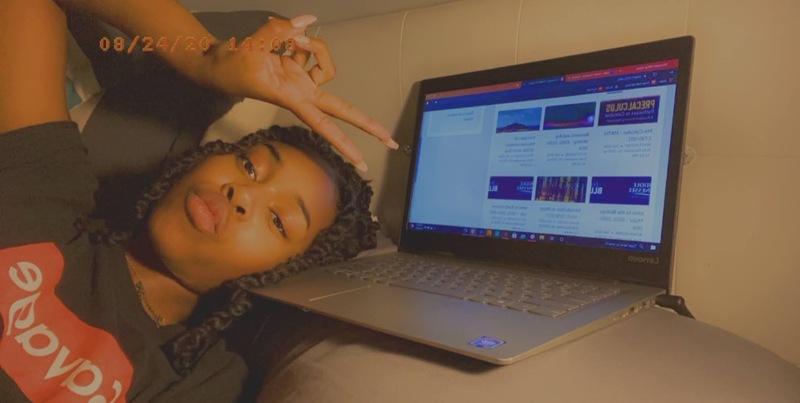 2020-08-24
2020-08-24First Day of School Picture
The picture I chose to add to the archive is my first day of school on August 24, 2020. In this picture, I was laying in bed with my laptop because everything was online. If you were lucky, you got a professor that taught class on Zoom. That is the closest to being in a regular classroom as it got. You were able to see your classmates (if they turned their camera on), you could have discussions with everyone, ask the professor questions and get immediate answers. On the other hand, you could get stuck with a professor who chose to use youtube videos and websites instead of teaching. These were the worst, poor to almost no teacher-student interaction, just discussion boards and Google. It was impossible for me to learn like this, I felt like I was not being taught! It was always stressful when trying to do assignments for classes like this because I did not understand the curriculum. If I needed to contact my professor, I just had to send an email and hope they would email me back soon with answers. Sometimes, I would not get a response until days later, a few times I never got a response. After a while of this, I started to feel miserable, stressed, and depressed. My grades started getting lower and lower and knowing how much school costs, knowing that I was going to lose my grants and scholarships because I was failing, I started having anxiety attacks. In my head, I kept saying, “I cannot learn like this, I know I am going to fail, so why keep trying?” Things got to a point where I would open my laptop, look at my assignments, cry, and then just close my laptop back up. I lost all my motivation and I lost sight of my dreams to be an optometrist. I remember the day that I dropped out, the defeat that I felt, feeling like a complete failure. -
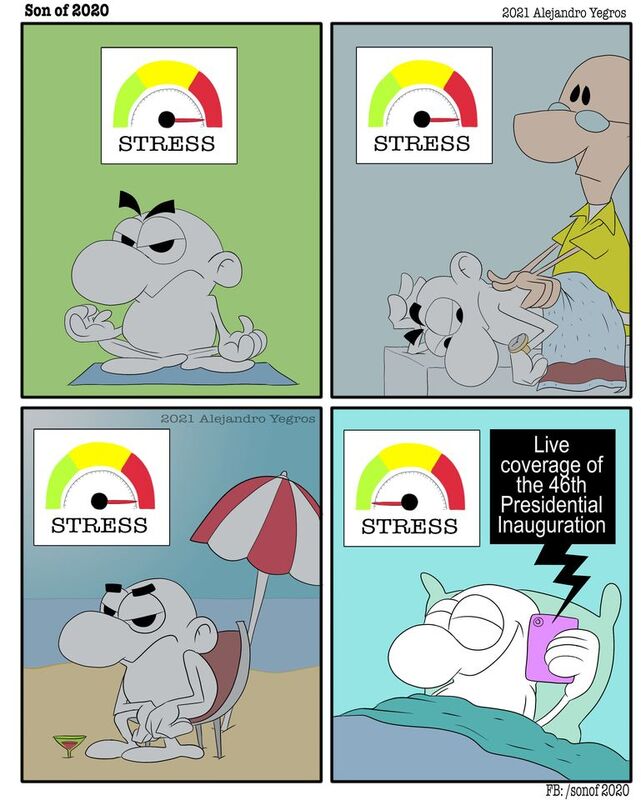 2021-01-21
2021-01-21De-Stressing Options
A comic strip about Covid-19 -
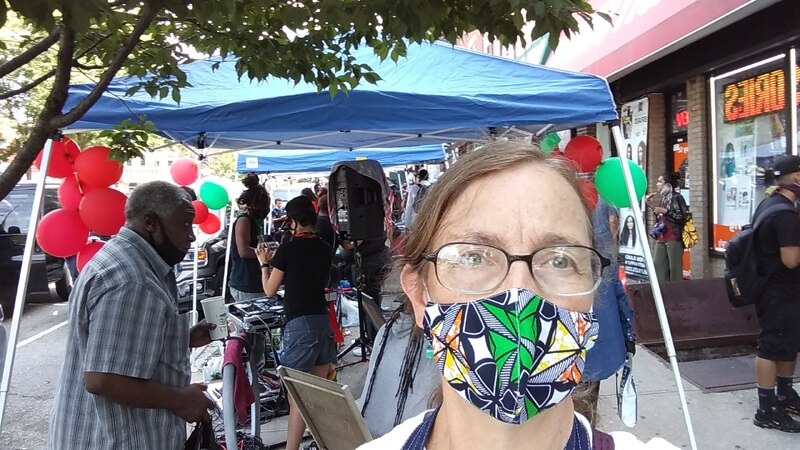 2020-06-22
2020-06-22Outside on the streets of Staten Island and Brooklyn
These photos depict some of the events and activities I was part of during the summer of 2020. I marched to protest the killings of innocent black men by police, I attended a street festival held in honor of Eric Garner (on the anniversary of his death), I worked at a Brooklyn Greenmarket doing "covid support" (a very stressful job), and I visited the peaceful grounds of Snug Harbor, wearing my favorite polka-dot mask made by a friend. -
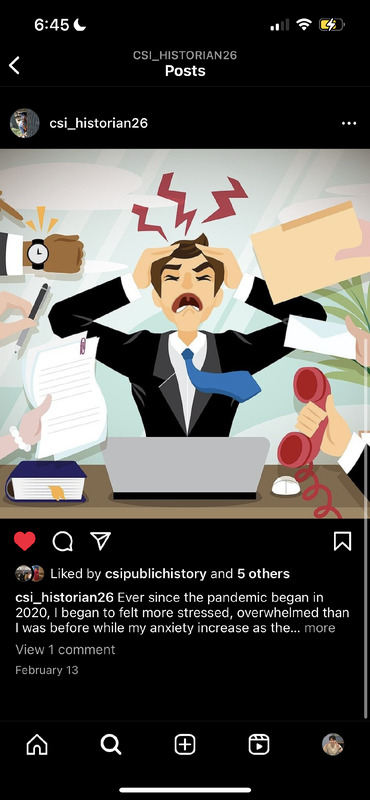 February 13th, 2023
February 13th, 2023Status of Mental Health During Lockdown
I was overwhelmed and stress when we went to online classes. The photo I posted is a representation of how I felt during that time -
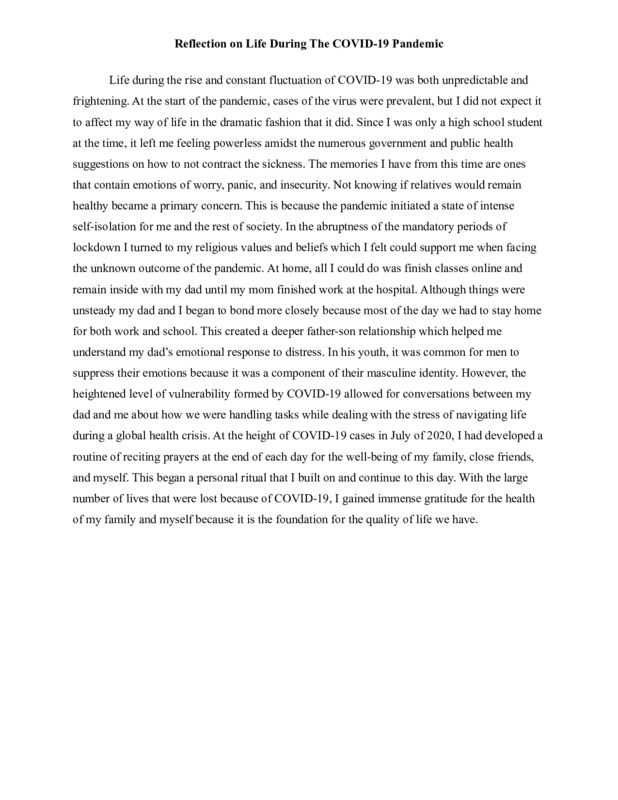 2022-04-29
2022-04-29My Experience of The COVID-19 Pandemic
Give a written account of how the COVID-19 pandemic affected my mental health, religious beliefs and personal relationships. -
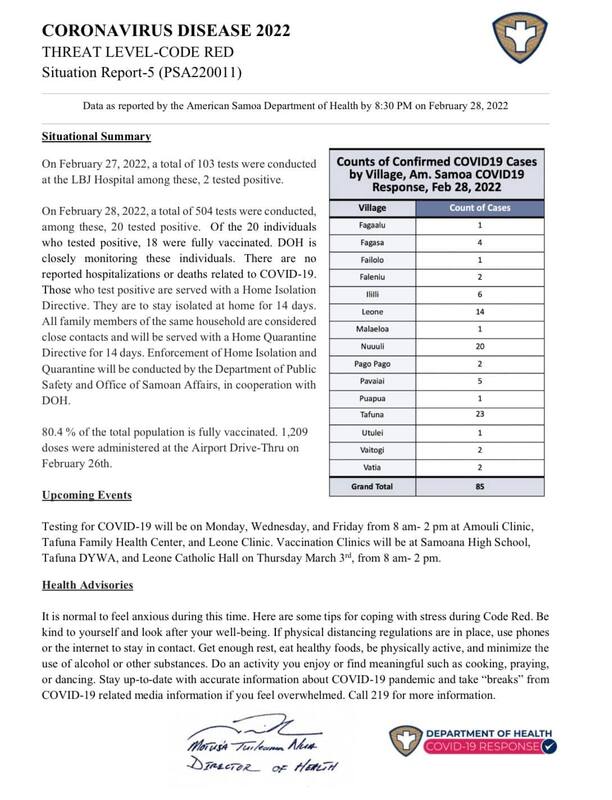 2022-02-28
2022-02-28American Samoa COVID Cases Situational Report #4
This is the fourth report released to the public by the Department of Public Health notifying the public of American Samoa of the number of cases that the island has as of February 27, 2022. From the past three reports, it seems as if from the past three days till now, the number of cases jumped from 22 to 85. While a summary is provided of the situation, upcoming events and health advisories are also included in the report for the public to continue to practice and where to get tested, vaccinated, or the booster shot. -
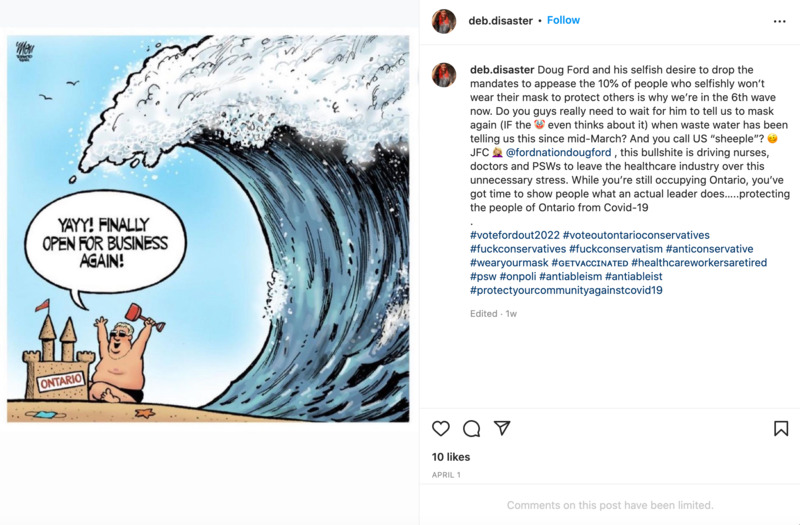 2022-04-01
2022-04-01Doug Ford's Disaster
This is an Instagram post by deb.disaster. This user is criticizing the disaster that Doug Ford has created in Ontario regarding COVID restrictions. They believe that by lifting restrictions to cater to 10% of people in Canada that he is putting people in danger. The comic posted above shows a sandcastle (Ontario) built by Doug Ford and a giant wave (COVID) coming down to destroy it. -
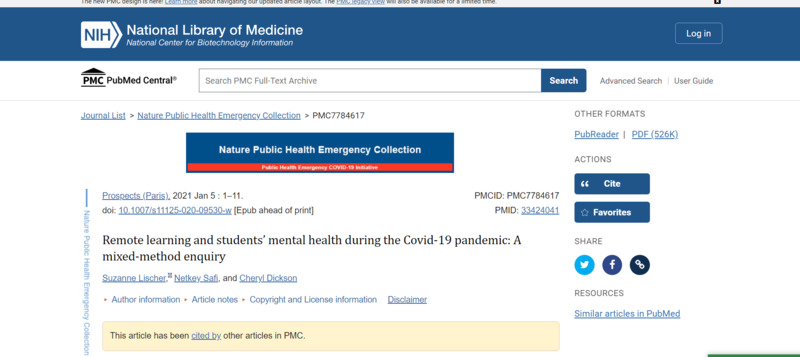 2021-01-05
2021-01-05The Covid Pandemic as a Senior in Highschool
The website that I am linking describes what happened to students all over the world in March of 2020 when all students in schools and universities had to go on lockdown and switch abruptly to complete online learning. This is an important covid-19 related topic to me because I was a senior in high school during that time, and I really struggled with my mental health, academic achievements, responsibilities, body image, and just overall my whole life. This article isn't as personal as it could get, but it gives a good historical and general idea of what student experience during the pandemic was like. -
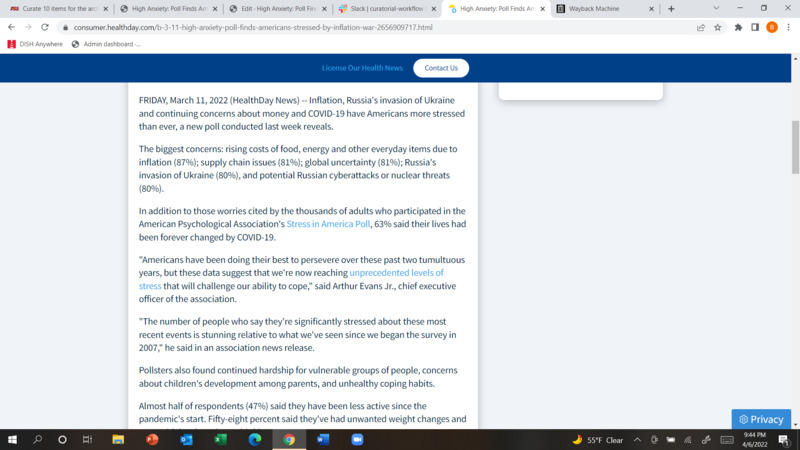 2022-03-11
2022-03-11High Anxiety: Poll Finds Americans Stressed by Inflation, War
This is a news story from Health Day by Robert Preidt. This is about a poll on what is making Americans most anxious. War, COVID-19, and inflation are at the top of what is making Americans feel anxious. Another thing the poll tells is that 63% percent said their lives changed forever due to COVID-19. 47% of people that took this poll also said that they have become less active compared to pre-pandemic. 58% said they had unwanted weight changes. Among those that gained more weight than they wanted, the average weight gain reported was 26 pounds. Others have said that the separation from others has put strain on relationships, or ended them. The APA reports that those with reduced social support are more likely to cope with stress. 56% say they could have used more emotional support during the pandemic. This poll had 3,012 respondents in February, and 2,051 from March 1-3. -
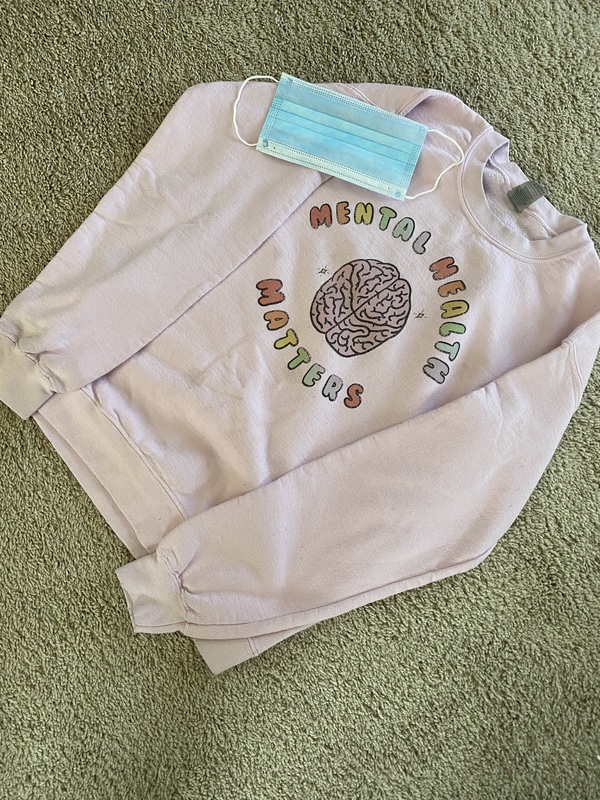 2022-03-26
2022-03-26Coping with the Pandemic--A Personal Look at Mental Health and COVID-19
According to the Center of Disease Control, in June of 2022, US adults reported considerably elevated adverse mental health conditions associated with COVID-19. Out of a survey they did on 5,412 people, 40.9 percent of respondents reported at least one adverse mental or behavioral health conditions, including symptoms of anxiety and depressive disorder which were around 31 percent. One of the causes of this is due to increase sedentary behaviors and low levels of physical activity due to quarantines and lack of business operation. Over the past two years, government mandated quarantine, work from home, and online schooling has caused me to stay at home for longer periods of time than what I use to. Because of this sedentary behavior, I had dealt with the negative effects of isolation, stress, and anxiety on both my mental and physical health. According to the World Health Organization, 150 minutes of moderate exercise or physical activity is usually recommended per week, however, with working a full-time job and being in school, the question that remains is how that is possible? I have learned to accommodate these physical needs indoors, by taking active breaks during the day and exercising at home. While this does not necessarily help with isolation and loneliness sometimes, I have learned to take these matters one day at a time and not shun myself for feelings them. CDC argues that from a recent comprehensive review that the impact of COVID-19 on mental health particularly seems to affect more young women disproportionally than any other group. Therefore, I recommend any young adult or women facing severe mental health to take advantage of online support or mental health services through telehealth such as ZocDoc. It is important to highlight COVID-19's impact on mental health in the United States and my personal life because it shows how the pandemic changed the means and the ways we received mental health services in the past. As the pandemic ventures on, people like myself will continue to have to find ways to cope and receive services for our problems. Thanks to the pandemic, much of our mental health problems have come more to the forefront due to us having ample amounts of time now to navigate and deal these issues unlike never before. -
2022-03-18
6 Ways Covid-19 Has Impacted My Daily Life
The biggest change for me since COVID-19 became a fixture in my day-to-day life is transferring permanently from a physical classroom to a virtual one. Teaching online has its own unique set of challenges in addition to the ones that it shares with classroom teaching. While I personally do not find teaching online to be as satisfying or engaging as the physical classroom, I am hesitant to return. I hear from colleagues about the behavioral issues, the lack of motivation, and the additional stresses placed on teachers by administration. While these are things I also deal with in a way in an online environment, compounding them with the potential risk of COVID when I have immunocompromised loved ones isn’t worth the risk for me at this time. Another big change in my routine is using more delivery services than I did before March 2020. I started ordering groceries through Instacart to avoid having to go the stores after experiencing the chaos more than a few times. Even though grocery stores have calmed considerably, and the shelves remain stocked with most in-demand supplies, I still use Instacart for shopping and having my groceries delivered. Some of this is convenience, but I think that the pandemic has simply changed the way I deal with groceries for the time being. At some point, I will more than likely return to the grocery store to resume shopping in person, but for now using delivery services will remain my weekly routine. Since the pandemic relegated many people to quarantining and spending more time at home, working and going to school virtually, I have noticed that I am not as social as I used to be. While I’ve never been a very sociable person, I’ve noticed that, not only do I not crave social interaction outside of my family and close friends as much as I used to, I have to “prepare” myself for social gatherings and interactions. I have more social anxiety than I ever thought I would and going to events where I may have to hold long conversations revolving around “small talk” make me anxious and tired. I hope that I am able to work through this over time as things become more open and social gatherings and events become more common, but it is another way in which the pandemic has affected me most. When I would leave the house prior to 2020, there were certain items I made sure I had: keys, sunglasses, purse, water bottle. A change to this routine now includes making sure I have a mask in my purse and masks in my car. It’s interesting to note that they have become both a physical and symbolic item in everyday life. Yet, as we all know, it’s an item that is important to have to make sure I am prepared in the event a business requires it or I’m interacting with places and people where it’s smart to wear one. To expand on the symbolism of the mask, another example of change in my life is interacting with anti-mask strangers who think they have an obligation to comment on or ask questions of people who wear one. My daughter came home a couple nights ago very upset because a customer had been rude to her because she was wearing a mask at work. My daughter is 17 and works in a grocery store. She wears a mask to protect herself and, in her words, “to protect her family”. I’ve noticed that the pandemic seems to have made some people feel like it’s okay to comment on and berate complete strangers on personal health decisions like it’s their right. Being socially distanced for months has made some people forget their manners or maybe it’s simply brought out the worst in them. Either way, the idea that a grown man might get in a teenager’s face at the grocery store over something that is none of their business and affects them in absolutely no way, is a startling shift in how people interact with one another since this all began. Lastly, COVID has not been kind to those working in the healthcare profession, and certainly it has made visiting people who are in the hospital much more restrictive. Last September my husband was hospitalized with a collapsed lung. Visiting policies essentially made it so that one person per day could visit him. Where previously I, his parents, children, and siblings might have been able to visit him, now it only made sense for me to be the one since I could bring him what he needed, talk with his doctors, and update everyone else. This most recent February, my mom was hospitalized for a serious health concern. During her entire stay, I was not able to visit her because it was most sensible for my dad to be there for her and ensure he could bring her things from home to make her comfortable. I was able to send flowers to brighten her room, but still the one visitor per day policy held firm. Last night my mom was readmitted to the hospital for health issues related to her previous issue. My dad stays with her all day, and I am not able to because of the visiting policy. It’s frustrating and heart breaking to not be able to see her and be there for her – and to also be there for my dad who needs support and time to recharge as well. The pandemic has highlighted so many privileges and everyday things that were once taken for granted – things most people (including myself) never even thought about. -
 2020-03
2020-03Dealing with my anxiety
As most young adults my age, I suffer from severe anxiety. Dealing with anxiety daily, can be very challenging at times, especially during a pandemic. I have been fighting a battle with anxiety most of my life. At this point, I am really used to the extra thoughts in my head. I have learned to help manage it, but not completely get rid of it. I believe that anxiety has made me who I am, in a way, because I do not remember a time where I was not struggling. In 2020, a pandemic instantly flooded the world. This completely impacted my entire life. I was not able to experience my last year in high school, I was not able to be around the one person that helped me with my anxiety, etc. I was forced to wear a mask that I could barely breathe in. I lost touch with most of my friends that I developed over my lifetime. This instant wave of depression suddenly hit me. I was so nervous on what would happen next, and how long will this last. People were dying from this pandemic. I constantly worried about if the sickness would hurt one of my family members or someone important to me. Over the time of being in quarantine, I thought to myself ways on how I could relax and not worry so much about the pandemic. I told myself every day, “Everything happens for a reason”. This is what I truly believe and for some reason it really does calm me down. I am Catholic. I am a very deep believer in God. To me, trusting in the Lord is the best anxiety reliever around. Covid-19 is still around today. Without Covid-19, I would not be where I am today. Although this pandemic has an abundance of negative impacts on my life, it also had some positive ones, too. I would not have attended Duquesne University, met so many amazing people, and made a plethora of memories that I would not trade in for. I believe talking about my anxiety, especially during the pandemic, is very critical because I am not the only one who is suffering, too. Everyone is nervous about what is going to happen next. To me, this is HUGE on helping me with my anxiety. I can finally think to myself that I am not alone. I believe that people who suffer from anxiety, especially from the pandemic started in 2020, can have a place to go if they are nervous. When I was struggling, I felt alone, and I was the only person who felt this way. My story will allow people to realize that they are not alone. Everyone is dealing with this stress and anxiety that I suffered from. My story tells people that I have worries and doubts, too. The pandemic not only had negative impacts, but they also had positive impacts. Focusing on the positives, will distract you from the anxiety and worrying. My story should help prove that. My story should allow people to see and find new ways to cope with the stress. I hope my story leaves a positive impact on people who did or are struggling. Everyone is in this together, and nobody will be alone in this major impact on the world. -
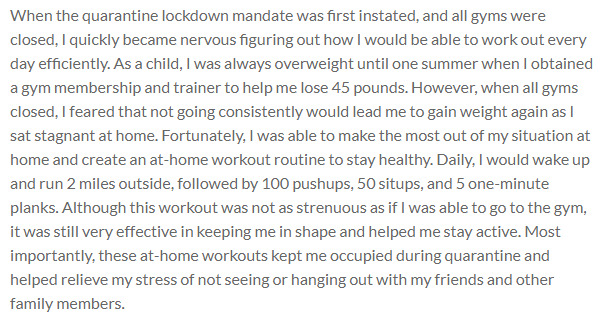 2020-03-20
2020-03-20Improvised workout during quarantine
When the quarantine lockdown mandate was first instated, and all gyms were closed, I quickly became nervous figuring out how I would be able to work out every day efficiently. As a child, I was always overweight until one summer when I obtained a gym membership and trainer to help me lose 45 pounds. However, when all gyms closed, I feared that not going consistently would lead me to gain weight again as I sat stagnant at home. Fortunately, I was able to make the most out of my situation at home and create an at-home workout routine to stay healthy. Daily, I would wake up and run 2 miles outside, followed by 100 pushups, 50 situps, and 5 one-minute planks. Although this workout was not as strenuous as if I was able to go to the gym, it was still very effective in keeping me in shape and helped me stay active. Most importantly, these at-home workouts kept me occupied during quarantine and helped relieve my stress of not seeing or hanging out with my friends and other family members. -
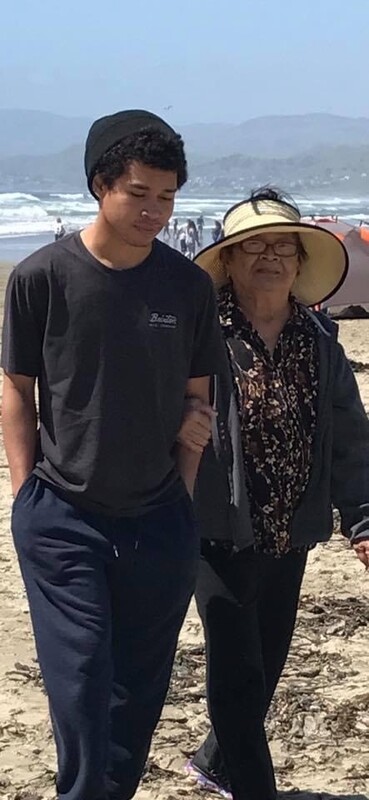 2021-12-10
2021-12-10My Time During Covid-19
During the Covid-19, I experienced a stressful time period just like most people. When the lockdown first happened I was scared and uncertain of what would happen. It was the first time in my life that I have ever had the feeling of being unable to hang out with friends and see family members. Many people I knew were still hanging out with people and doing social activities just like there was not a pandemic going on. I wanted to still do social activities with them and visit people but I was unsure if that was safe to do, so I decided to just stay in the house and be safe. My grandma is going through chemotherapy and I did not want her to catch covid if I did happen to get it, so my whole family was being extra careful to not catch the virus. During this time period I kept in touch with friends by playing online video games and facetiming my family members. The strangest part of this time period for me was the social aspect of the pandemic. Whenever you would go to the store in my area the shelves would be empty, and people would just walk past you and were not willing to talk to anyone. I usually take in person classes for school, and I had to make the transition to doing classes online for the first time. All sports had to cancel all of their events so I was not able to compete in any of the events for the entire year. This was definitely a year of fear and uncertainty for many people, but when I look back there were a lot of positives that happened. The most positive thing was that I got to spend a lot of time with my family. Mostly everyone in my household is busy all the time and we all never get too much time to just sit and talk even though we all live in the same house. During the lockdown we all got the chance to spend a lot of time together since there was not a whole lot going on. I was also able to spend a lot of time talking with friends that I have not talked to in a long time over online video games, and I got back into skateboarding which is a hobby that I have not done in seven years. Even though I was fearful of the virus, I experienced a time period where I could focus a lot on being as productive as possible, and it gave me a lot of gratitude for how things are today where things are mostly back to normal. Just like it was for a lot of people, there were definitely a lot of bad experiences that happened during the Covid -19 period for me, but there are also good things that I am thankful for. Hopefully people can focus on the positives that happened during that time period as we push forward past it. -
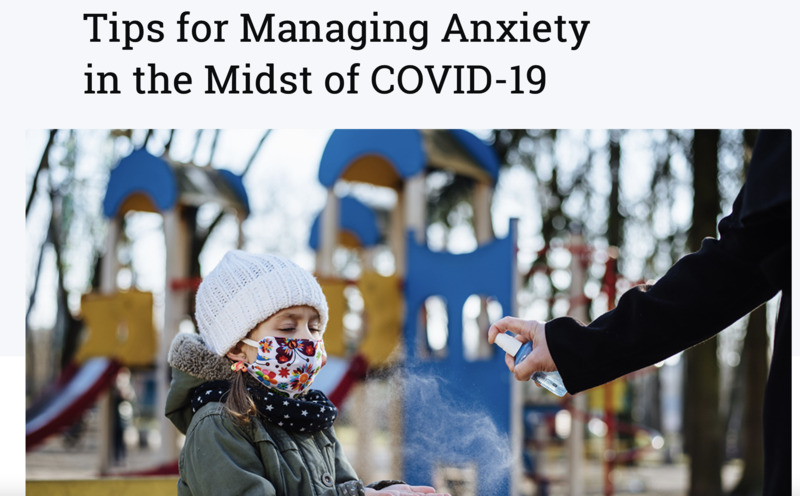 2020-07-15
2020-07-15Tips for Managing Anxiety in the Midst of COVID-19
A blog post from Banner Health about managing stress and anxiety during Covid-19. -
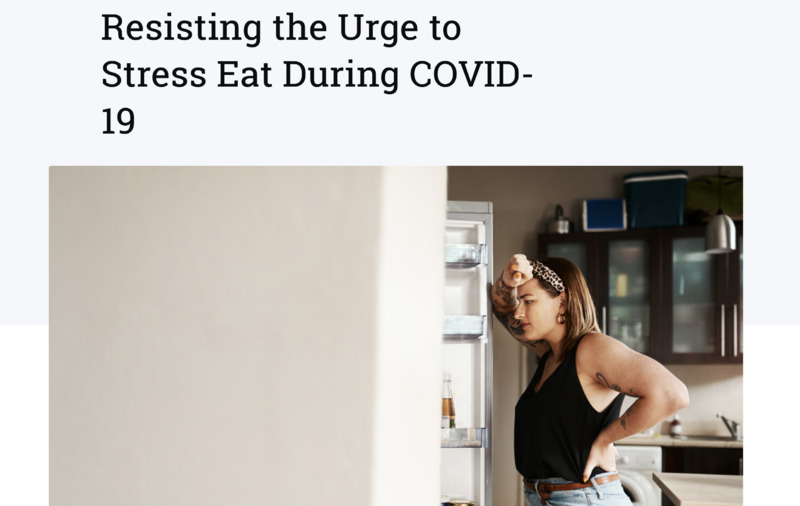 2020-05-26
2020-05-26Resisting the Urge to Stress Eat During COVID-19
A blog post from Banner Health on managing the urge to emotionally eat. -
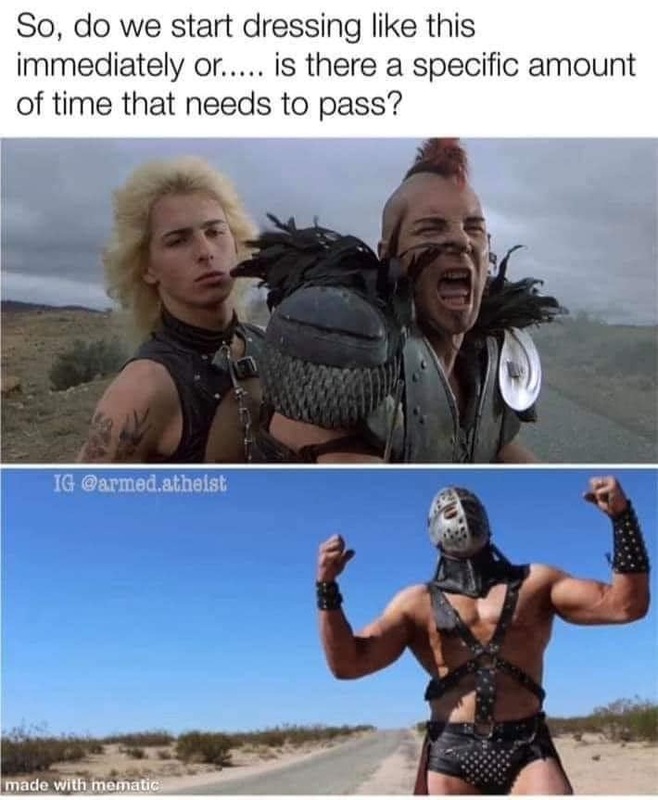 2020-03-22
2020-03-22Apocalyptic Wear during Pandemic-A Funny Meme
In the early days of the pandemic, life was very scary. There was a lot of uncertainty as to how long things would last, who would get sick, and how to adjust to all of the rapid changes taking place. It often felt a lot like a looming apocalypse. This meme just struck a cord with me. In a moment of stress it caused laughter. I only wish we did end up wearing some form of apocalyptic wear. I am disappointed that didn't happen. -
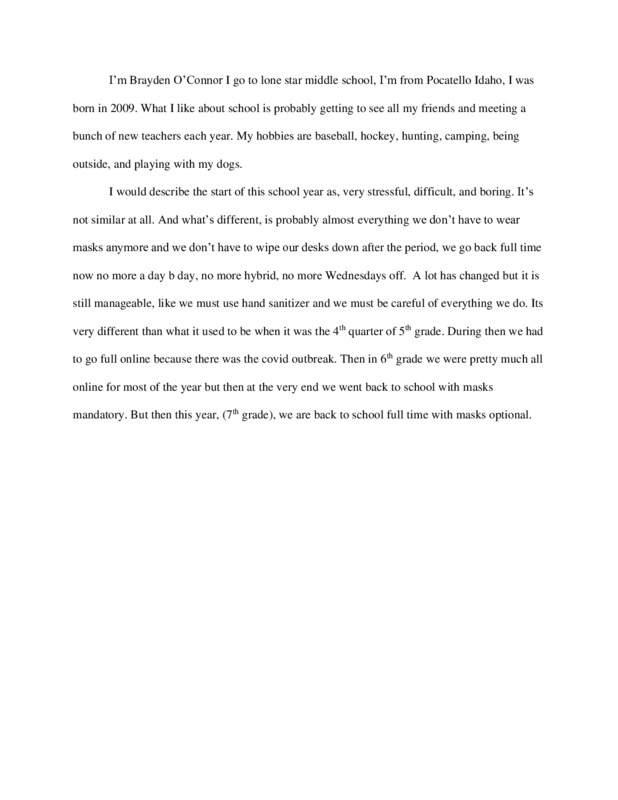 2021-10-08
2021-10-08covid in 2021
I’m Brayden O’Connor I go to lone star middle school, I’m from Pocatello Idaho, I was born in 2009. What I like about school is probably getting to see all my friends and meeting a bunch of new teachers each year. My hobbies are baseball, hockey, hunting, camping, being outside, and playing with my dogs. I would describe the start of this school year as, very stressful, difficult, and boring. It’s not similar at all. And what’s different, is probably almost everything we don’t have to wear masks anymore and we don’t have to wipe our desks down after the period, we go back full time now no more a day b day, no more hybrid, no more Wednesdays off. A lot has changed but it is still manageable, like we must use hand sanitizer and we must be careful of everything we do. Its very different than what it used to be when it was the 4th quarter of 5th grade. During then we had to go full online because there was the covid outbreak. Then in 6th grade we were pretty much all online for most of the year but then at the very end we went back to school with masks mandatory. But then this year, (7th grade), we are back to school full time with masks optional. -
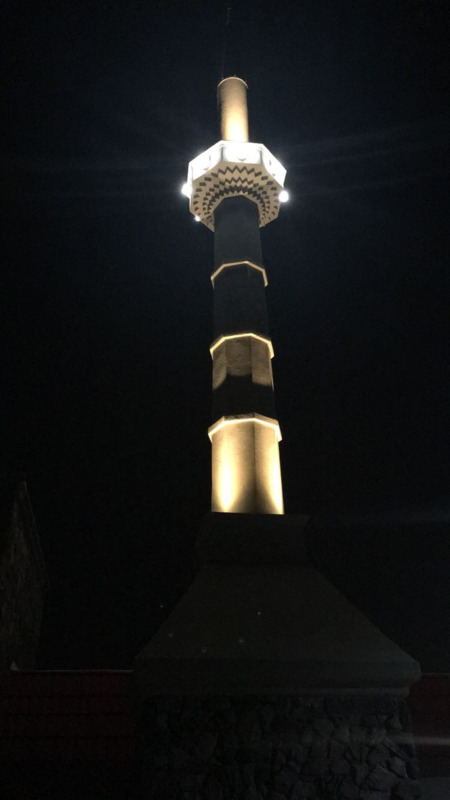 2020-07-17
2020-07-17Finding Peace Through Religion
This is a photo of a part of the mosque I attend. This was significant to me because of the impact that religion has on my personal life. I feel as if I have always referred back to religion in my times of need, so when the world was in a very difficult spot, I turned to the thing that always seemed to help me. COVID has turned the world on its head since its arrival, and there seems to be no answer for it. It took countless amounts of lives and left so many others in bad shape. It created a sense of unpredictability for everyone around the world, not knowing if they, or someone they loved, would be infected with it. At the end of the day, it has been something we have learned to live with. As I mentioned earlier, my religion has always proved to be a relieving factor in my life. I would turn to it in my times of need when I felt uncertain of what could happen. In the times we have gone through, my religion has allowed me to voice my concerns and find comfort where I couldn’t find in other places. I always felt as if it was something that I could turn towards. This photo shows a Munara, as we say in Bosnian. It is a pilar that typically sits in front of mosques and allows Imams to call for prayer. When this call is heard, people are reminded to give some of their time to worship. I feel as this pilar can also represent what religion meant for me during the pandemic we were living through. When I see it, I would get reminded to pray and connect myself with God to seek answers for my problems. This would allow me to alleviate my stress and gain peace of mind through prayer. Each person would find comfort in different ways during this pandemic, for me, it was hearing this pilar call me back to something I could not forget about. -
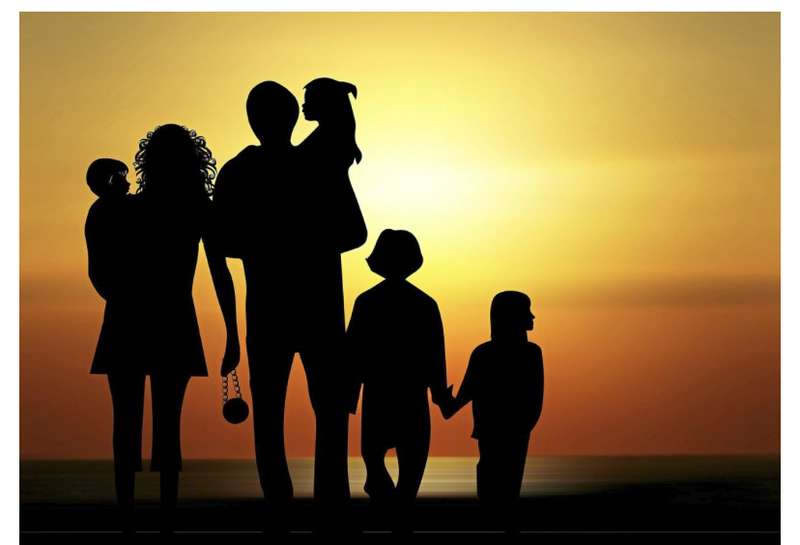 2021-10-05
2021-10-05Pandemic 2020
The pandemic affected many of our day to day lives. To start off it isolated us from socializing with friends, family, coworkers and others. It restricted us from doing our normal daily activities and routines. It made us miss important events and milestones that we can’t take back. For me the pandemic was very difficult, although the pandemic has not ended, the start of the pandemic was the biggest hardship. To start off, I had just started a new job that required me to help others get through the pandemic. I was assisting about 12 dr offices in scheduling patients. This was overwhelming to say the least and caused stress and anxiety. Many of us were facing challenges that can be stressful, overwhelming, and cause strong emotions in adults and children. Public health actions, such as social distancing, were necessary to reduce the spread of COVID-19, but that could make us feel isolated and lonely and could increase stress and anxiety. I know for me it was very hard not to be around my family. I’m very close with my family and not being able to see them and hang out with them definitely took a toll on me. For starters I was not able to be in the delivery room with my sister who was pregnant at the time and I was not able to meet my niece in person for months. The first time I met her was through FaceTime, which was not the same as being able to hold my first niece. Adults struggled adapting to new social routines—from choosing to skip in person gatherings, to consistently wearing masks in public. Daily activities that one would normally do were taken. For me my daily activity was the gym and with the pandemic it caused a shut down and once it reopened it was difficult to adjust to the new “normal”. -
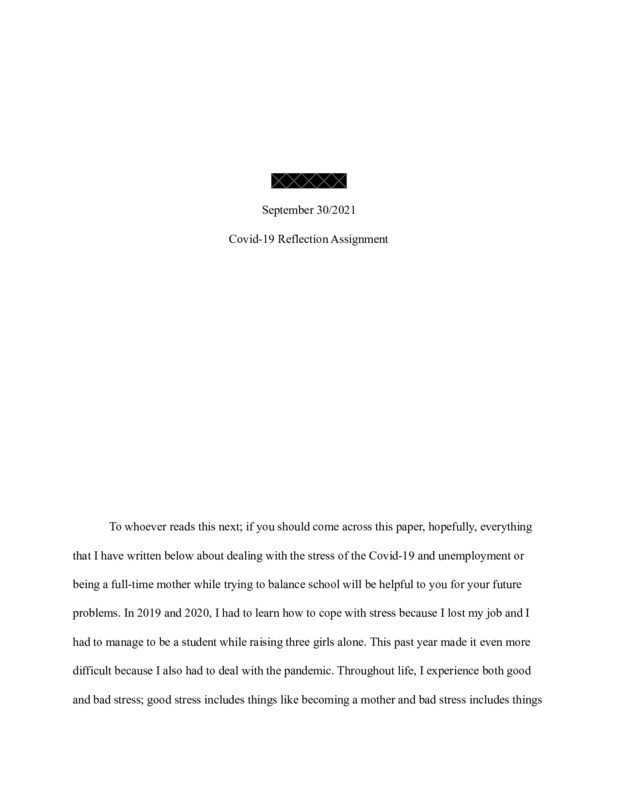 2020-08-01
2020-08-01THE PANDEMIC
The Pandemic change my life for better. -
 2021-09-21
2021-09-21Life During the Pandemic
In March of 2020, I was sent home from Duquesne University due to the rising COVID-19 pandemic. At the time, I did not grasp the magnitude of the situation, but I quickly realized that the next year and a half were going to be rough. As soon as I got home, signed up for Door Dash to maintain steady income while most places were either closed or under heavy regulations. Personally, I was not concerned about contracting the virus myself, rather bring the virus home to my family. My sister worked on a COVID floor in a hospital, and I was working everyday around people as well. We were very cautious because my mother is immunocompromised, meaning her immune system is weaker than normal. If I were to bring the virus home to her, or anyone in my family, I would have felt terrible, so I was very cautious when I was working for Door Dash. I wore my mask everywhere I went, inside restaurant, outside while delivering food, everywhere. Also, during this time, I had to take care of my grandmother and great aunt as well. Both of them live very close to where I live, so I had to deliver groceries and medicine to them for a year and a half. That part was the most concerning. With both of them being over the age 65, being cautious was an understatement. After about a year od delivering food and such to them, the moment the vaccine was available, my family took the opportunity. I was the last to get the vaccine, as I was more worried about my family rather than myself. Living during COVID was not easy. The constant worry on if I had the virus if I had a slight cough or a sore throat was tiring. Constant stress was hanging over me and on top of that, school was not easy either. Online classes were tough, as I am very much an in-person learner, but at the end of the day, my family is all healthy and I am as well. COVID-19 was a challenge but being able to overcome those times was incredibly relieving. -
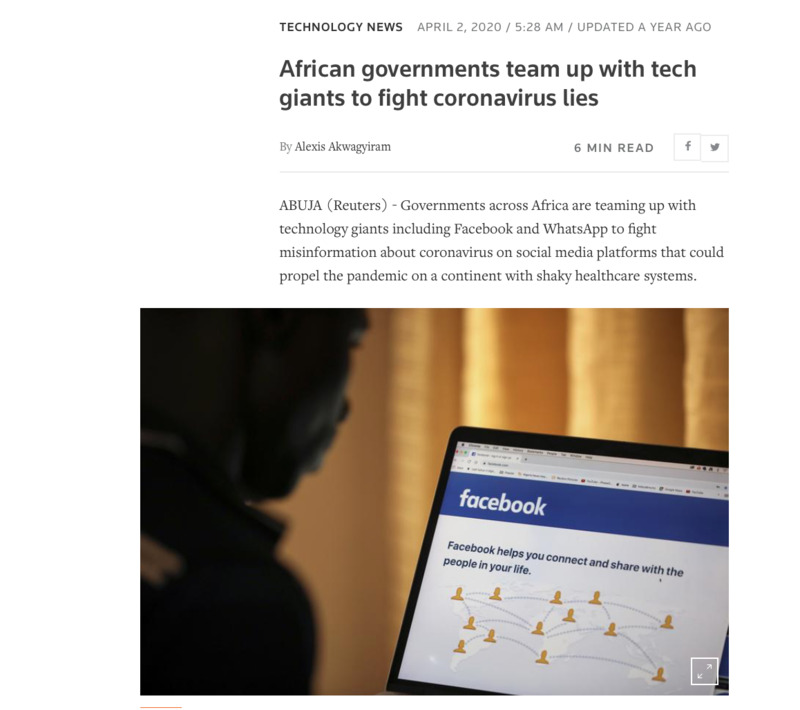 2020-04-02
2020-04-02False Rumors
In Alexis Akwagyiram’s Reuters article named “African governments team up with tech giants to fights coronavirus lies”, she details how African countries are partnering with tech companies like Facebook, Twitter, and WhatsApp to ensure citizens are up to date with news on the coronavirus and prevent false rumors from spreading through these channels and eventually causing a spike in cases. In the article, Akwagyiram mentions how “false claims that garlic, beetroot, and lemons are an effective alternative to antiretroviral drugs' ' continued to spread in most African countries. However, those claims reached the African community here in the United States. My mom, a Ghanaian woman, trying to find ways to prevent herself from catching the virus, especially since she had to work during the height of the pandemic, found herself believing these said rumors. I remember entering the kitchen every morning to see her making a mixture of garlic, hibiscus herb, and ginger boiling on the stove and pouring them in cups for the family to drink. This daily routine took a toll on her health as she began to experience symptoms such as trouble swallowing, difficulty sleeping, and irritability after eating which her doctor later diagnosed as acid reflux. With my mom already having an underlying disease and being immuno-compromised, she had to start taking new medications to prevent the reflux from affecting her blood pressure. What was supposed to alleviate stress and prevent us from catching the virus, just brought more trouble to my family with us now having to worry about the effect of this new diagnosis on my mom’s well-being. -
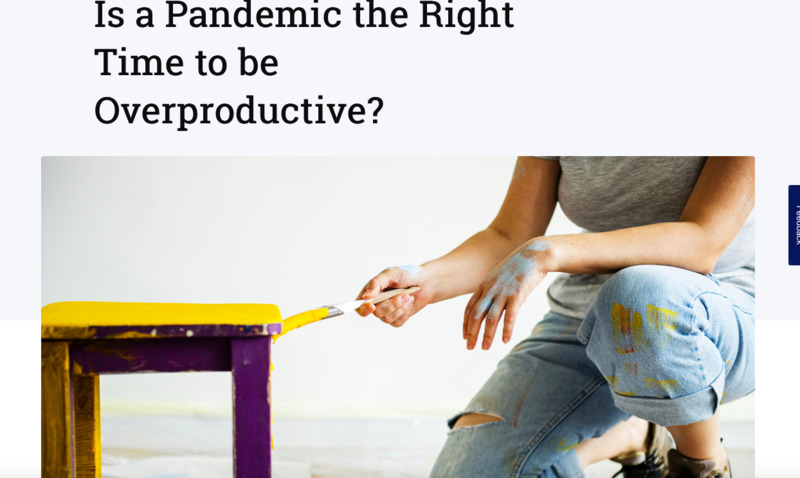 2020-05-06
2020-05-06Is a Pandemic the Right Time to be Overproductive?
A blog post from Banner Health about being productibe during the pandmic. -
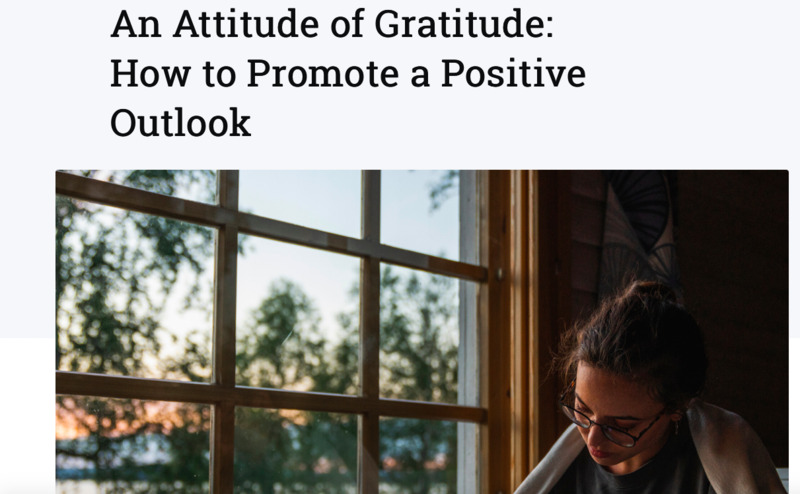 2020-04-09
2020-04-09An Attitude of Gratitude: How to Promote a Positive Outlook
A blog post from Banner Health offering suggestions on maintaining a positive attitude during the pandemic. -
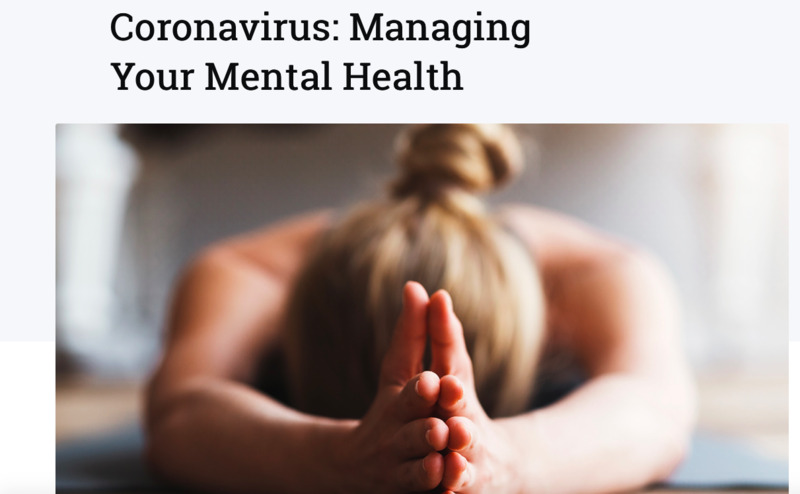 2020-04-03
2020-04-03Coronavirus: Managing Your Mental Health
A blog post from Banner Health about managing mental health during Coronavirus -
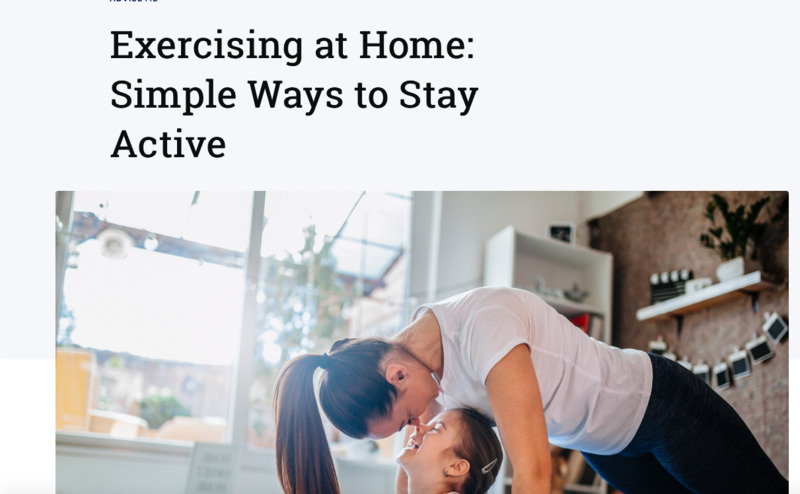 2020-03-26
2020-03-26Exercising at Home: Simple Ways to Stay Active
A blog post from Banner Health offering suggestions for working out at home -
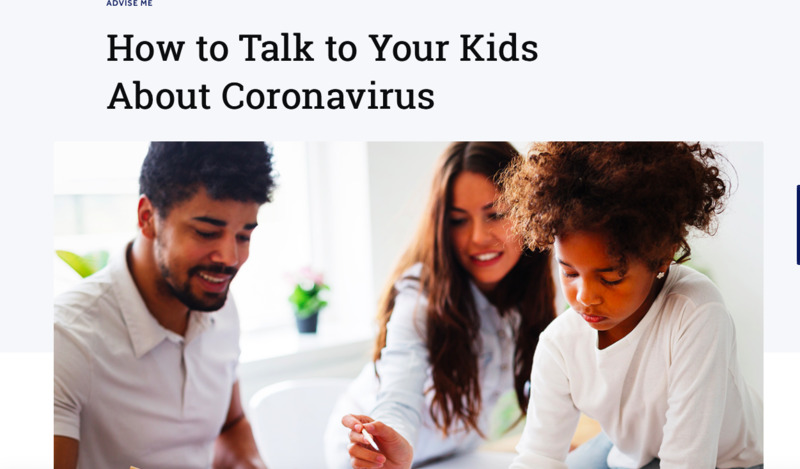 2020-03-24
2020-03-24How to Talk to Your Kids About Coronavirus
A blog post from Banner Health Blog about talking to children about Coronavirus and the pandemic. -
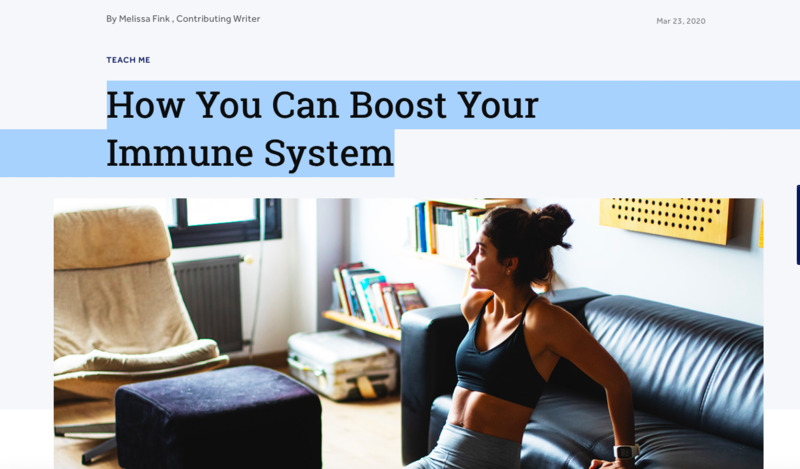 2020-03-23
2020-03-23How You Can Boost Your Immune System
A blog postfrom the Banner Health Blog about boosting your immune system. -
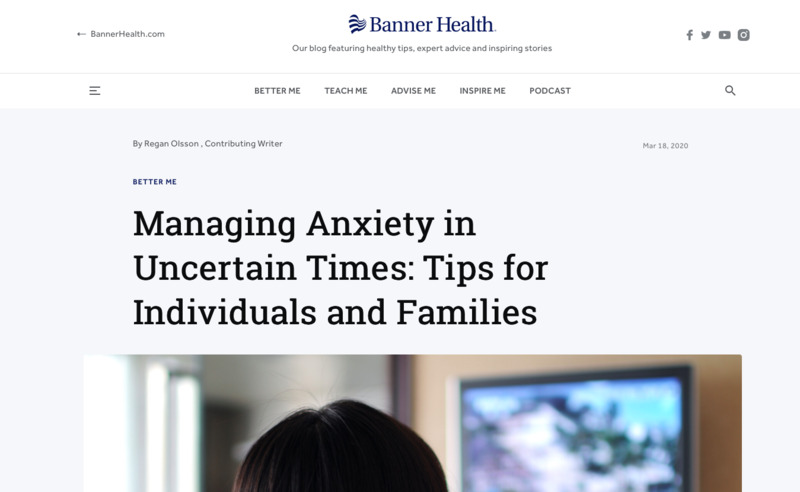 2020-03-20
2020-03-20Managing Anxiety in Uncertain Times: Tips for Individuals and Families
A blog postfrom the Banner Health Blog about managing anxiety during Covid-19 -
 2020-04-20
2020-04-20Nature can boost your mental health during COVID-19 pandemic
The pandemic has negatively affected many individuals' mental health. This article describes the benefits nature can provide in improving one's mental health during this time. -
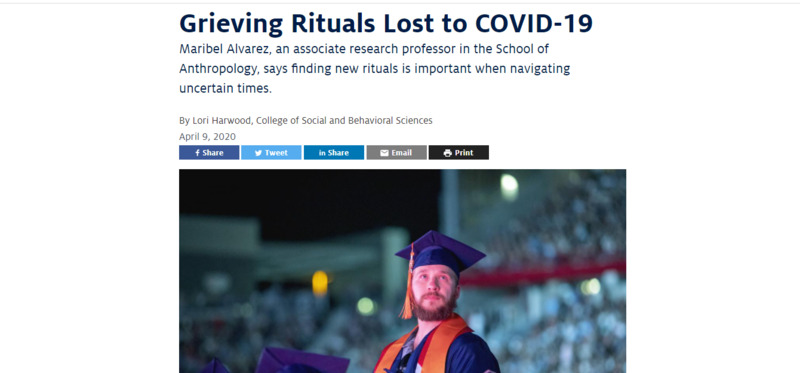 2020-04-09
2020-04-09Grieving Rituals Lost to COVID-19
Rituals are an important way to celebrate special occasions and victories as well as to deal with the stresses of life. This article discusses the grieving process people have gone through because of the loss of rituals (graduations, funerals, weddings) during the pandemic and the importance of creating new rituals. -
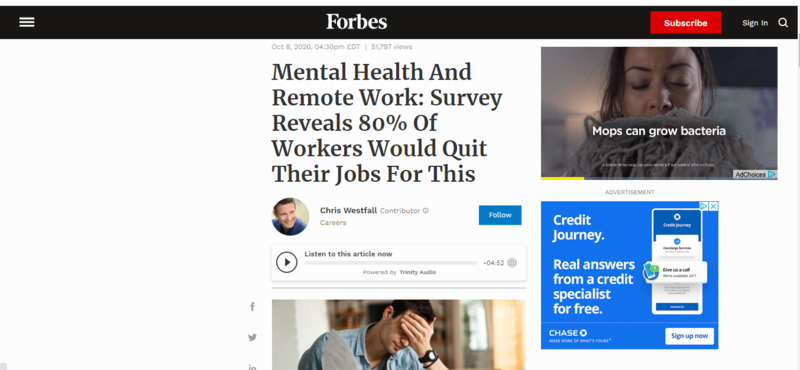 2021-07-23
2021-07-23Mental Health And Remote Work: Survey Reveals 80% Of Workers Would Quit Their Jobs For This
Teleworkers during the pandemic have experienced mental health challenges. For some individuals, working from home during the pandemic has increased their anxiety and stress levels. They have found it difficult to unplug from work, work longer hours at home than they did in the office, and struggle with the lack of social interaction. This article discusses ways that employers can support their employees and address their mental health struggles. -
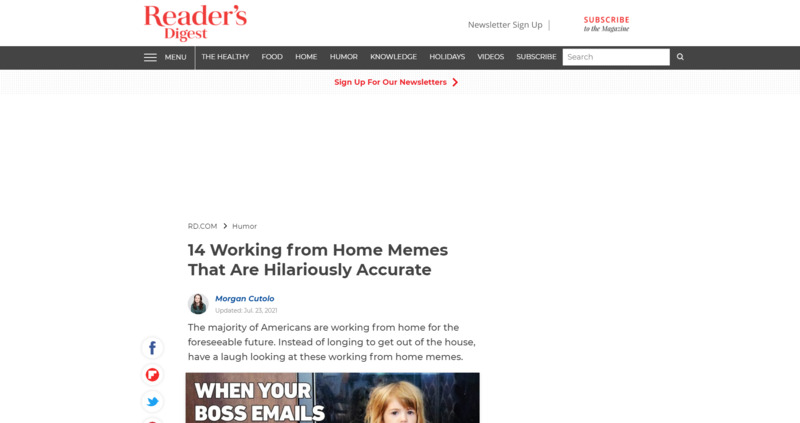 2020-07-19
2020-07-1914 Working from Home Memes That Are Hilariously Accurate
Humor is one of the best ways to deal with stressful situations, such as working from home. This collection of memes take a humorous look at the teleworking lifestyle. -
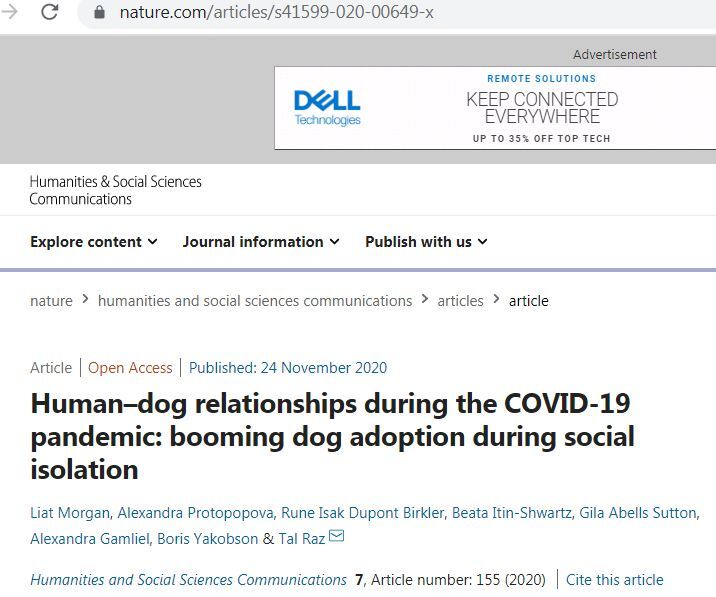 2020-11-24
2020-11-24Human–dog relationships during the COVID-19 pandemic
A study done in Israel looks at the relationship between humans and dogs during the pandemic. The study finds that, like in the United States, there was a significant increase in dog adoptions in Israel during the pandemic. They also found a direct correlation between the mental health of the owner and the perceived quality of the life of the dog. -
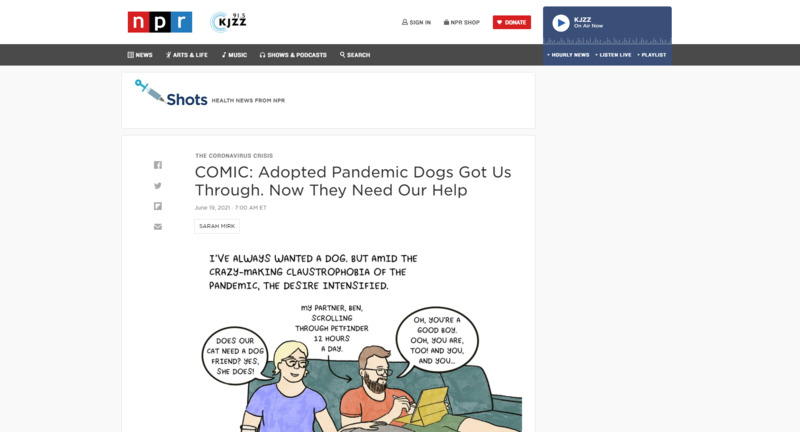 2021-06-19
2021-06-19Pet Adoption Comic NPR
This comic is fun, engaging, and informative. It talks about the increase in pet adoption during the pandemic and how pets helped a lot of people deal with emotional trauma. It cautions would-be pet owners not to jump blindly into adopting and to think about what will happen when life returns to normal. Separation anxiety can be difficult for pets to deal with, and owners need to have a plan for that. -
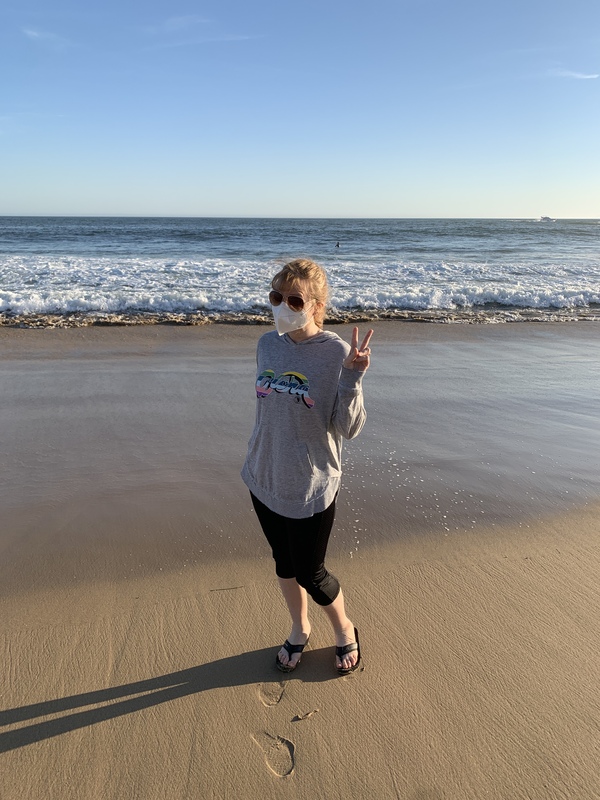 2021-05-27
2021-05-27Slower Pace of Life
It’s probably a bit tiresome for my best friend when I say “oh man, we haven’t been there in over a year” because for our family, that is everything. Every week, we open up a little more, cautiously, as our case rates continue to decline (under 50 new cases in our county today!) Disneyland, our go to hangout is still out of the question, so we returned to the beach. It’s crazy to think for over a year, it sat 20 minutes away, so close but so far. I feel like COVID not only has made us more appreciative but has also helped us embrace a slower pace of life. Two years ago, a weekday would have seen me at school AP reviews or department meetings, my mom and I coordinating pick up and drop offs for Kumon, gymnastics, piano lessons. I would have squeezed in a Pilates class before picking up my daughter from the gym. My husband wouldn’t be in the equation at all, April and May are full travel months - we barely see him. But here we are. Our pace of life is much slower. My husband is still working remotely, and will probably continue to for at least half the week for the rest of the foreseeable future. Kumon and piano seem simpler to do now that we’re all home. Even gymnastics seems less stressful. If everyone is home on a weekday at 3, why not hit the beach? I know our lives will inevitably speed up. That’s the rat race that is Orange County and I do love our lives. We like being busy, why else would someone live here? Yet, I hope the togetherness we’ve had in the past year and the realization that maybe we should just take more time to run around the beach, get excited at finding a Sea Hare, and just watch the waves without an agenda or a clock will last beyond this pandemic. -
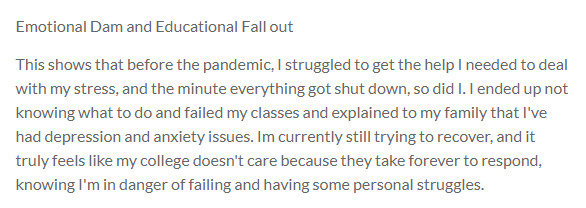 2020-07-10
2020-07-10Emotional Dam and Educational Fall out
This shows that before the pandemic, I struggled to get the help I needed to deal with my stress, and the minute everything got shut down, so did I. I ended up not knowing what to do and failed my classes and explained to my family that I've had depression and anxiety issues. Im currently still trying to recover, and it truly feels like my college doesn't care because they take forever to respond, knowing I'm in danger of failing and having some personal struggles. -
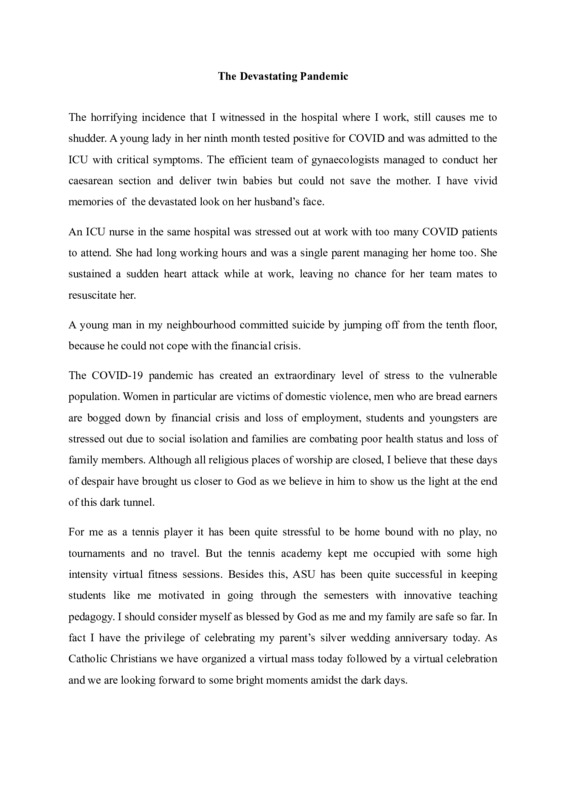 2021-04-24
2021-04-24The Devastating Pandemic
I have been witness to some really traumatic life events. This has made me experience the pain and agony of individuals and their families during this pandemic. This has also made me grateful for keeping me and my family safe. -
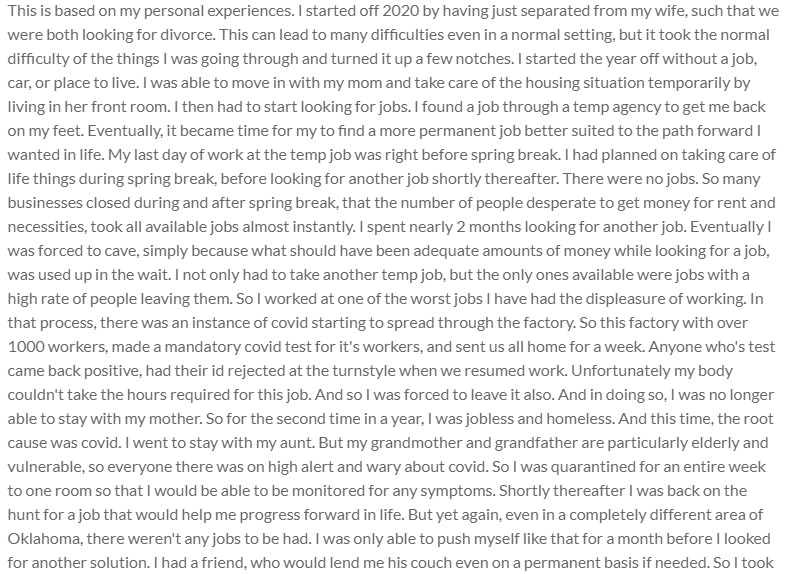 2021-04-23
2021-04-23Difficulty set to hard
This is based on my personal experiences. I started off 2020 by having just separated from my wife, such that we were both looking for divorce. This can lead to many difficulties even in a normal setting, but it took the normal difficulty of the things I was going through and turned it up a few notches. I started the year off without a job, car, or place to live. I was able to move in with my mom and take care of the housing situation temporarily by living in her front room. I then had to start looking for jobs. I found a job through a temp agency to get me back on my feet. Eventually, it became time for my to find a more permanent job better suited to the path forward I wanted in life. My last day of work at the temp job was right before spring break. I had planned on taking care of life things during spring break, before looking for another job shortly thereafter. There were no jobs. So many businesses closed during and after spring break, that the number of people desperate to get money for rent and necessities, took all available jobs almost instantly. I spent nearly 2 months looking for another job. Eventually I was forced to cave, simply because what should have been adequate amounts of money while looking for a job, was used up in the wait. I not only had to take another temp job, but the only ones available were jobs with a high rate of people leaving them. So I worked at one of the worst jobs I have had the displeasure of working. In that process, there was an instance of covid starting to spread through the factory. So this factory with over 1000 workers, made a mandatory covid test for it's workers, and sent us all home for a week. Anyone who's test came back positive, had their id rejected at the turnstyle when we resumed work. Unfortunately my body couldn't take the hours required for this job. And so I was forced to leave it also. And in doing so, I was no longer able to stay with my mother. So for the second time in a year, I was jobless and homeless. And this time, the root cause was covid. I went to stay with my aunt. But my grandmother and grandfather are particularly elderly and vulnerable, so everyone there was on high alert and wary about covid. So I was quarantined for an entire week to one room so that I would be able to be monitored for any symptoms. Shortly thereafter I was back on the hunt for a job that would help me progress forward in life. But yet again, even in a completely different area of Oklahoma, there weren't any jobs to be had. I was only able to push myself like that for a month before I looked for another solution. I had a friend, who would lend me his couch even on a permanent basis if needed. So I took him up on that offer. And I moved from Oklahoma to California. That drive was more or less the most impactful part of covid to me. I had seen the roads get empty on my way to/from work as people had stopped non-essential travel. But Oklahoma didn't have an enforced mask mandate. We could still go to the store, or pay for gas for our car, without being required to wear a mask. Many businesses still had indoor dining even. But in that trip, the realization of the impact of covid, hit me. It was at the only gas station for 20 miles in either direction in the mojave. I walked up to the door to go in and pay for gas. And for the first time that year, I saw a sign saying masks were required to enter. After that, every other location I stopped at was the same. There were no more places I could go without a mask. Covid, was having a real and significant impact on other things in the world than just jobs, and people's financial struggles. After having made it to California, in a particularly populated area with plenty of jobs, I was still unable to find a job for two months, simply because of how the rest of the year had gone for me. Simply by requiring a stable work history, I was no longer able to apply for most jobs. Finally I did get a job. I got one in the food industry. And the impact of covid hit hard there too. After having finished my training, and worked for about a week, the state mandate came that closed both our indoor dining. A month later, outdoor dining followed suit. We weren't allowed to take drinks back to add things we may have forgotten, and instead had to remake them entirely, because of covid safety precautions. I've had my temperature taken every single work day since I started, which was unheard of in times before covid. Twice, we've shut down the store because a partner tested positive for covid, and everyone that worked with them was placed in a mandatory two week quarantine. The impact is so strong, that the company is even providing 2 hours paid time for both doses of the vaccine, as incentive to get vaccinated. It's clear to see, covid has had an incredibly strong impact on life, and turned the difficulty level of many peoples lives up beyond manageable levels. -
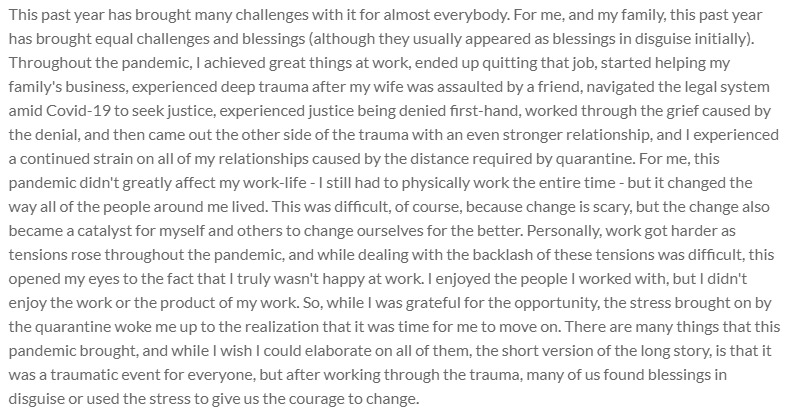 2021-04-23
2021-04-23The Dorbin Journey
This past year has brought many challenges with it for almost everybody. For me, and my family, this past year has brought equal challenges and blessings (although they usually appeared as blessings in disguise initially). Throughout the pandemic, I achieved great things at work, ended up quitting that job, started helping my family's business, experienced deep trauma after my wife was assaulted by a friend, navigated the legal system amid Covid-19 to seek justice, experienced justice being denied first-hand, worked through the grief caused by the denial, and then came out the other side of the trauma with an even stronger relationship, and I experienced a continued strain on all of my relationships caused by the distance required by quarantine. For me, this pandemic didn't greatly affect my work-life - I still had to physically work the entire time - but it changed the way all of the people around me lived. This was difficult, of course, because change is scary, but the change also became a catalyst for myself and others to change ourselves for the better. Personally, work got harder as tensions rose throughout the pandemic, and while dealing with the backlash of these tensions was difficult, this opened my eyes to the fact that I truly wasn't happy at work. I enjoyed the people I worked with, but I didn't enjoy the work or the product of my work. So, while I was grateful for the opportunity, the stress brought on by the quarantine woke me up to the realization that it was time for me to move on. There are many things that this pandemic brought, and while I wish I could elaborate on all of them, the short version of the long story, is that it was a traumatic event for everyone, but after working through the trauma, many of us found blessings in disguise or used the stress to give us the courage to change. -
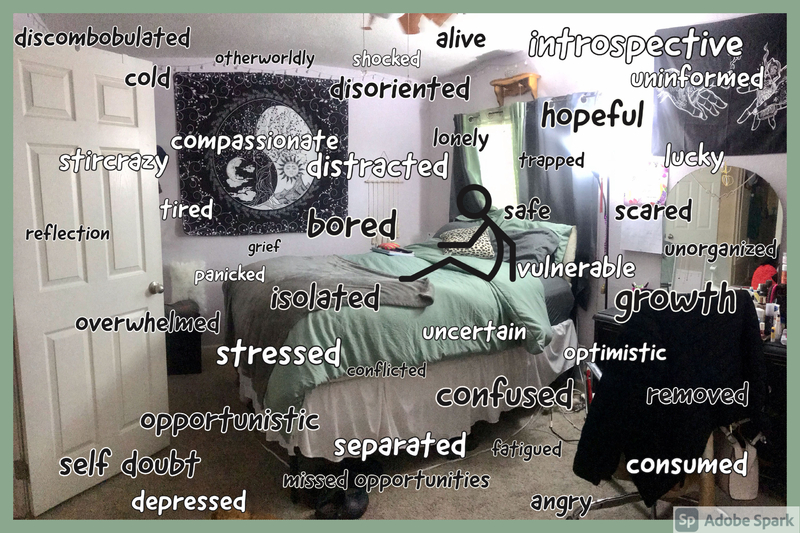 2021-04
2021-04How Covid 19 Made Me Feel
I created this image to visually represent my experience with covid-19. The goal is sharing my personal experience in hopes this reaches people who have felt the same. The coronavirus pandemic has affected people globally. Everything from anger to hopefulness, confusion to contentment can be used to describe experiences and feelings in regards to the pandemic as a whole. This foreign virus is historical, and will be in records as one of few other pandemics of this magnitude. This contribution to the archive is one of many attempting to provide an understanding for the future. -
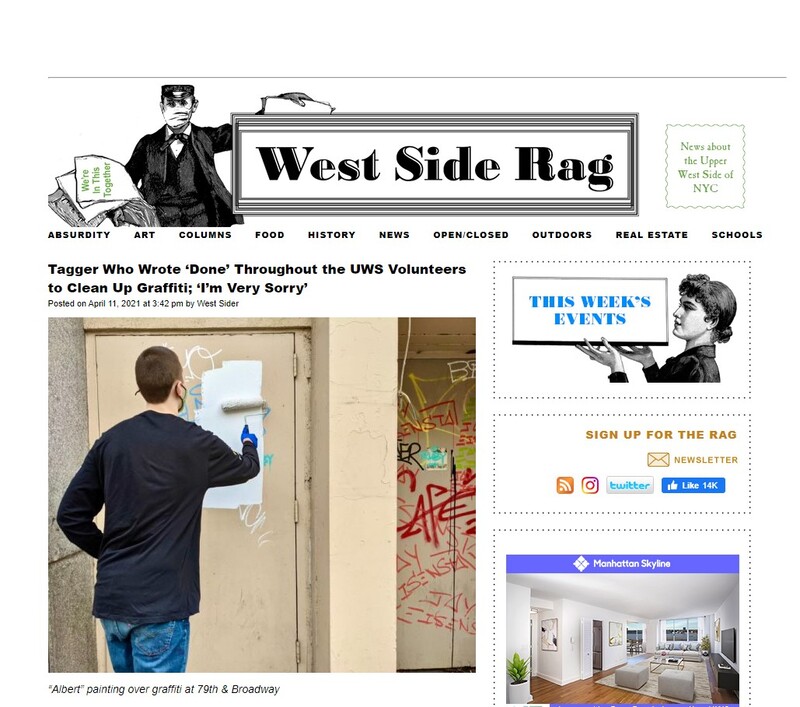 2021-04-11
2021-04-11Pandemic Street Art: teenage tagger made to apologize and cleanup
New York teen tags the streets in "response to multiple stressors. Quarantining boredom. Family problems. Feeling stuck since graduating high school and not yet finding a job or college that fit." -
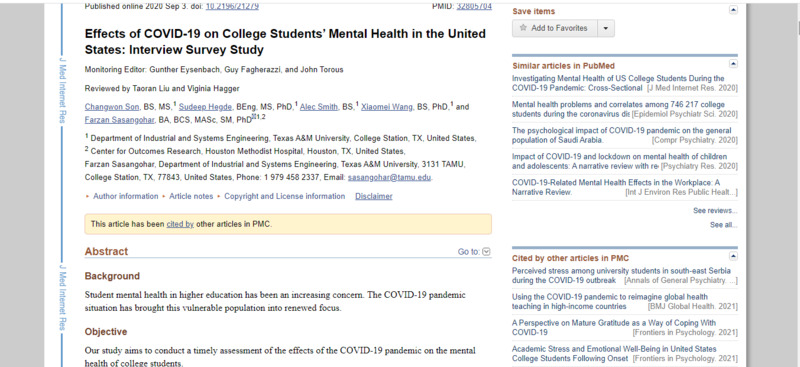 2020-09
2020-09College Students During COVID
This is a story about how college student's mental health has been affected during COVID as a unique population. I wanted to include this to provide context about why my interviewee may have been reluctant to seek out resources due to the extra stress that he had been experiencing. This study goes into how the factors that college students, in particular, are experiencing. This article was done by a survey and shows how common these feelings are that may have deterred students from seeking help due to stress. -
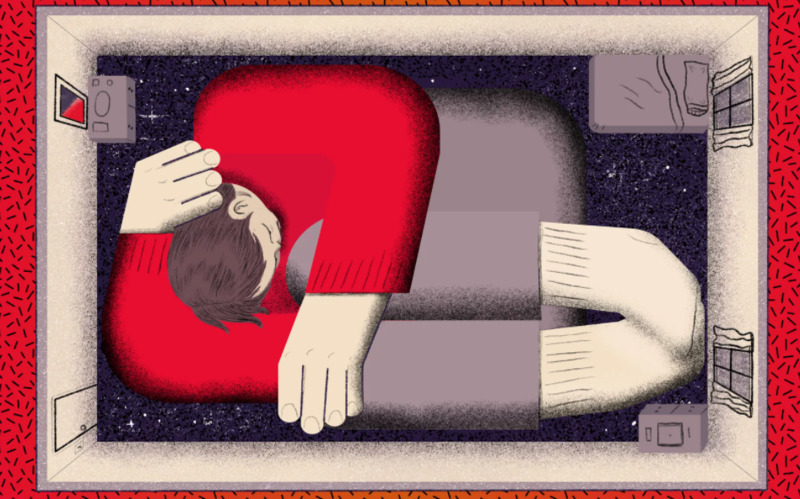 2021-03-31
2021-03-31How does the pandemic affect children?
This link is a podcast with which talks about a specific family of 4, including 2 girls ages 5 and 7 and the two guardians who have health witnessed changes in their children's behavior due to covid. It is a very interesting read and listen as both the children now have been hearing things about deaths due to covid and because of that say things such as "I don't care if I die". The read goes on to state some factual information, some important things said include, " a sex-abuse hotline operated by the Rape, Abuse & Incest National Network reported that half its calls in March came from minors, for the first time in its history." This was somthing that I heard for the first time and was shaken. Not only are children going through the stress of their own during the pandemic but they stay home and are potentially being abused. For some children going to school was an escape. I was though was very happy that these minors had information on who to contact for help. -
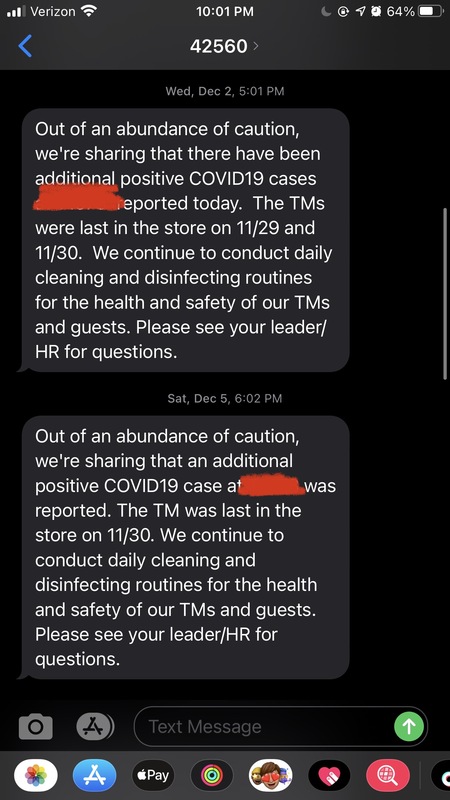 2020-12-05
2020-12-05Covid-19 Notifications
For six months during the pandemic, I worked at Target. During that time, this is how we were notified of positive Covid cases within our store. Due to privacy reasons, this was often all the details we would receive, leaving us wondering if we should be getting tested or taking extra precautions. This was particularly stressful during the holidays, as there would be at least one text regarding a positive case per week. On the week in the screenshot, there were three positive cases in one week. It often left many of us more stressed than we already were with the influx of holiday shoppers, but we had to continue with our work as is nothing was wrong in order to keep the store functioning to the best of its ability. By the end of the year, we were all surprised when we went more than a couple days without a text. -
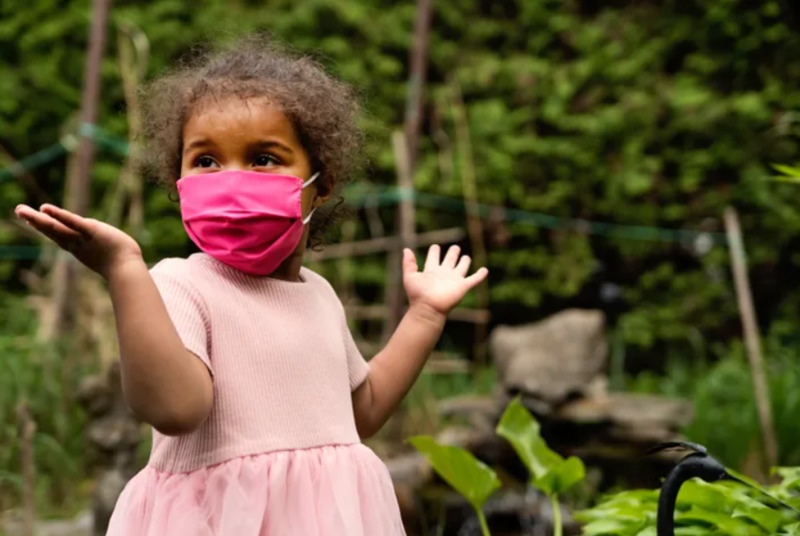 2021-02-03
2021-02-03How does the pandemic affect children?
This link discusses if experts are really worried about if the development of toddlers is important or are there bigger issues. A fact stated in this text says " that 60% of teenagers say they’re lonely to deeply troubling federal data that revealed a 24% jump in mental health-related emergency room visits among 5- to 11-year-olds." This is a very concerning matter as children as young as 5-11 should be living a healthy life mentally and physically as those are the prime time of their growth and development. It goes on to talk about how these prime timed years of a child's life affect how he is as an adult. Certain aspects that small roles in a child's life may unknowingly affect it as it grows. -
 2021-03-20
2021-03-20Oral History: Interview with Anonymous Peace Officer #1
James Rayroux 0:00 My name is James Rayroux. I'm a graduate student in global history at Arizona State University, and I'm working as a curation intern with the "Journal of the Plague Year" COVID-19 archive. Today is March 21, 2021, and it's just after 5pm or 1700 hours here in Arizona. I'm speaking with a narrator who wishes to contribute to the COVID-19 archive anonymously. Sir, I first want to thank you for speaking with me and contributing to this COVID-19 archive. Do you consent to having this interview recorded, transcribed, and immediately posted to the "Journal of the Plague Year" COVID-19 archive, where it will be made accessible to the public? Anonymous Officer 0:39 I do. JR 0:40 Thank you, I greatly appreciate you making time to share your experience with us. In lieu of your name and city, can you provide me with a summary of your background and professional experience in law enforcement? AO 0:57 Yeah, I've been a sworn police officer for a little over 10 years in northern Colorado. I've worked for a couple different departments during that time. I started off at a small municipality, and at one point worked for a state law enforcement agency and then working for a municipality that has approximately 150,000-160,000 citizens within the jurisdictional limits of our department. JR 1:25 Can you give me a summary of your life before law enforcement and what led you to police work? AO 1:33 Yeah, so I grew up with a family of cops, a grandfather and two uncles who were police officers, so I'd always kind of had that in the back of my mind. When I was a teenager, I started working out with an alcohol and tobacco compliance team. So I would go in and attempt to buy tobacco and alcohol products underage to ensure that corporations were properly ID'ing the people who came in to buy those products. I studied criminal justice a little bit in college, although that's not what my degree's in. I went to a police academy and then worked at the departments that I previously mentioned. And then within the realm of police work, my emphasis has mainly been of a traffic safety, impaired driving nature, so that's where my expertise kind of lies within the realm of police work. JR 2:38 What are some of your professional goals over the next few years, and where would you like to, what would you like to accomplish before the end of your career? AO 2:50 My sights in the next couple of years, I'm currently working on a master's degree in organizational leadership. With that degree, I would like to promote within my department to at least the rank of sergeant. And like I said earlier, I work for a larger department. Previously, I came from smaller departments, and I kind of missed that small town feel, so eventually, I'd like to parlay that supervisor experience in my larger department into being a supervisor at a smaller municipality or a smaller county agency where I think I could bring both sides of working for a small agency as well as looking at working for a large agency to help a smaller agency, because they don't usually get a lot of super qualified candidates for the higher positions. It's kind of what is already at the department, which sometimes is great, and sometimes it's not so great, and I think that having somebody that just hasn't came up through that agency to bring some new kind of fresh ideas is really good for us. That's ultimately the goal. JR 3:58 And when and how did you first learn about the SARS-CoV-2 virus in early 2020? AO 4:08 Initially, I heard about it on the news, broadcast news, and then I visited enough websites, mainly Reddit, which is often called "the front page of the internet" that kind of started talking about it and how it was kind of on the West Coast. Obviously, Northern Colorado is more westerly in the US, than, you know, the middle of the country, and Denver, our biggest city in Colorado, obviously has an international airport, and there's lots of things that come through, so I kind of kept an eye on it. Also with the nature of my work, I come into contact with people of all different kinds of races, religions, sexes, creeds, orientations, all of that both, willingly and unwillingly, so I kind of kept my eye out and knowing that there could be a good chance that if it came to Colorado that I would be involved with it just because, traffic stops, disturbances, sometimes we have to take people into custody against their will if they have a warrant, or they're fighting us, so that's a really close contact, like hands-on situation. So I knew if it did get worse, I didn't expect to be this bad, but if it did get worse, that it'd probably end up affecting us in one way or another. JR 5:22 Do you remember what some of the early conversations were like that you had about the SARS-CoV-2 virus or COVID-19, what those conversations at work were like or were about? AO 5:36 Yeah, a lot of them were just kind of like, you know, this is just a really bad flu. As long as you, you know, sanitize your hands after you deal with people, which is a pretty common thing that cops do. I know, the majority of cops that I work with carry around a little bottle of sanitizer, either on their person or in their what we call a "war bag," a little bag that sits in the front seat that holds all our tickets and everything else we need for the shift. So it was initially just, you know, be smart. If somebody's sick, keep your distance if you can, wash your hands, sanitize. And then once summer comes in, because early it was spring, where it's still pretty cold here, that once summer comes, the heat will naturally kill it off, and it's not going to be anything worse than the normal flu was initially the talk around town. JR 6:24 How did your agency first deal with the COVID-19 pandemic? AO 6:30 So initially, we got multiple emails, kind of just updating it from what they've heard from the Surgeon General in Colorado that was disseminated to people higher up in the city side of our agency, with just tips, kind of like what I just talked about, wash your hands, you know, don't touch your face or mouth, sanitize your hands, sanitize your cars. And it was just kind of a more official version of what we all kind of thought, which was that it was just a worse flu as long as you, you know, stay at home with your sick, don't voluntarily interact with sick people, etc, etc, that it would be good and we'd be done by summer. JR 7:13 At what point did your agency start encouraging or mandating mask use by employees? AO 7:23 So I want to say early March is when the governor of Colorado put us on a statewide lockdown. So I want to say maybe mid February to late February, is when we got a order to make sure that we're wearing masks, if we're around each other, if we're going to be in somebody's house. They were saying they prefer it on traffic stops, but they know because of the nature of us standing in traffic and it's kind of already hard to hear that, that was kind of our discretion. But I want to say mid to late February was the big one. It's also when we stopped doing in-person briefings. We have a specific briefing room where our sergeants, commanders will talk to us about what happened earlier in the shift, what they expect of us tonight, just conversations about our shift in general that's usually done in a room. It was about that time that we move that outside. So we all just kind of stood outside our police department and ended it to be a little bit safer than being in the booking room. But even when we did that we still wore masks were outside doing our briefing. JR 8:28 What do you remember or what did that first pandemic briefing or roll call look like when everyone showed up in, in masks? AO 8:37 It was definitely interesting. You know, it's just something that you usually don't see unless you're in a hospital setting, which we obviously go to sometimes if we have bad car accidents or bad assaults. But again, even that's usually if the person is thought to have been sick or something else, where you're obviously not standing in the emergency or the surgery department. So it was a little bit different seeing everybody with these, at the time, surgical masks. We ended up getting given cloth masks and everybody eventually started you know, finding a mask they liked better, but initially, it was just paper surgical mask like you see at the hospital, so it was definitely a strange sight to see twenty cops standing around with their mask on. JR 9:23 How have your agency's policies and procedures changed since that initial response in February 2020? AO 9:31 Um, so as COVID kept going up and more and more cases and especially in Colorado, and especially Northern Colorado where there was a higher outbreak than the rest of the state, we got, I don't know the name of the product but it's essentially a super medical grade cleaning product that is so strong that you have to wear gloves and a mask anyway when you're using it because it can burn your hands and you don't want to inhale it. So we are given directives to wipe down everything we touch on our car. So steering wheel, driver-side door handles, radio mics, computers, shifter, etc, with that cleaning product both before and after our shift. And then our department also bought a bunch of small hand sanitizer bottles for everybody to carry with them. And then we had two big jugs in our, what we call patrol room where we type our reports, that we could refill those smaller bottles with. And then we were given a mandate to wear masks anytime we were in contact with somebody. And if we could, any calls that we were, we can, we would normally take in person, such as like a cold theft or something just for customer service reasons, if we're not super busy, we'll usually go to that person's house and just get their statements so they can have a face-to-face contact. We were given a directive, though, to do all that over the phone as much as we can. So there would be nights that just wasn't a busy in-progress night, and I would take fifteen calls, all from my car parked in a parking lot somewhere. So after a decade of doing this, that was a big difference in what I was used to. JR 11:12 For the benefit of the audience, can you explain what a cold theft report is? AO 11:17 Yeah, so a cold theft report is if somebody came home from dinner, and let's say their son, their twelve-year-old son left their bicycle just outside in the front yard leaned up against the house, they get home and that bike was gone. And they don't have any kind of surveillance systems, you know, they weren't home when it happened, so they know that something was stolen, but they have no idea of exactly when, no real description of who might have taken it, and we call that a cold theft. It just means that it's not something that's in-progress. Like if somebody were to call and say, "Hey, you know, there's actively a fight going on right now at the mall." Um, that would be an in-progress call, or a hot call is what some people call it. Anything cold, so a cold theft, a cold burglary, a cold auto theft just means that it's something that's not actively happening, and they don't really have much information to go on. JR 12:05 Thank you. Do you remember what your first inperson call was after you began wearing masks, and maybe your first call after the public started wearing them as well? AO 12:19 I don't recall the specifics of either. I know that there was a couple calls I went to when you know, we were mandated to wear the masks. And you know, police officers still have freedom of speech just like everybody else does. But, you know, working for any organization, whether public, like the government or private, you still follow the rules and policies, procedures of your police department or your, your company. In this case, my police department or my company said that, you know, there's a new policy that we'll wear these masks. So it was weird, because there are some houses we go to where we would talk to people in-person and, you know, they'd be like, "Well, this is dumb. I don't know why you're wearing this mask. This is essentially the flu, why would you wear it?" You know, I'd have to be like, "Well, you know, my opinion on it is irrelevant. At this point, I'm here for a reason, but my boss told me to wear this, and my department told me to wear this, and that's why I'm doing it." And then we get the opposite where we go somewhere, and we would have the mask on and so would they and they're like, "You know what, I'm really glad that you guys are taking this seriously, and, you know, there's a lot of people that aren't." At that point, they're happy so I'm not going to say anything to change it. But you know, we would give people a mask that would ask us. "I'm glad you guys are doing this. Do you think this is as bad as it is?" And I would say, "You know, well, my again, my opinion on it's irrelevant. My boss told me to wear this mask, my department told me to wear this mask, so that's why I'm wearing it. Anyway, how can I help you with the reason that you called today?" JR 13:53 Has the pandemic changed your sense of security around fellow cops or fire crews or EMS personal? AO 14:02 I don't know if it's so much has changed my sense of security. I know it's changed things that we've, we've done things a lot different. It's not uncommon for police officers and my agency or anywhere across the United States to also be dispatched to fire medical calls. And we provide what's called scene security. So firefighters, a lot of them also double as paramedics and EMTs. And obviously EMTs and paramedics are those things. They have a job to do, and that's you know, rescuing people or providing life saving medical intervention on people. And sometimes especially if it's drug or alcohol fueled, there can be other people on scene that are concerned or upset and they want to get involved with it. And so law enforcement will get dispatched to assist with that and make sure that the scene is safe or secure, so that the firefighters and EMTs can do what they need to do. And usually we'd always go to those. It changed a lot where if somebody was COVID-19 positive or had symptoms of it, and it didn't seem like we needed to be there, we would go to a lot less of those just to keep our officers safe and not put them in unnecessary danger. JR 15:11 Has the COVID-19 pandemic affected your process or procedures for detaining, arresting, or booking suspects or arrestees? AO 15:23 Not so much for detaining or arresting, those thresholds are met at certain times, and for various reasons. You know, so I've detain people before that, I don't think are alleged to have committed crime at that point. But because of their general behavior, or things they've said or things they've done it, they're detained from an officer safety perspective, so they can't hurt us, and they don't hurt anybody else. Obviously, I've detained people because I feel like they may flee from us, and, you know, I have a reasonable suspicion that they've committed a crime, and so they're going to get detained until we can figure everything out. So our department is really great about stressing as far as keeping yourself and your partner safe, nothing changes. So whatever you need to do to make that happen is fine. I work for a municipality, so our "booking standards" is what we call them, so what we can and cannot book people for is set by the sheriff of our county, who runs the the jail. Because of the COVID things, and obviously, you get inmates that are together in tight spaces, and there's a lot of them, he relaxed them, and essentially lowered the threshold of crime that it would take. So in Colorado, we have three different classes of misdemeanor with M-1 or misdemeanor-one being the highest and M-3, or misdemeanor-three being the lowest. Same with felonies, there's one through six, one is the highest sixth lowest, he essentially made it where we can't book on any misdemeanor charges for a while, which are the majority of what we deal with, I'd say. And two, we just cite them into court and give them a summons to court to appear in front of a judge to address the charges that they're alleged to have committed. That was different. So I think that was the sheriff's way of trying to control the inmate population so it just doesn't have as many people packed together. JR 17:18 In the past few months, do you suspect or have you thought that, during your interactions, a member of the public or a suspect or even another officer has attempted to use the pandemic or a possible COVID-19 infection to, to alter your interactions with them? AO 17:42 I don't think I've seen that from officers. We have definitely seen it from people that we've contacted on the street, and especially people that still meet those arrestable jail booking standards. We were told by the jail to ask a series of questions before we brought them in. You know, "Have you been in contact with anybody with COVID recently? Have you tested positive for COVID? Have you been out of the country?" There's a bunch more other ones, and it's pretty easy to kind of tell what we're getting at by the directions, the questions go. And we've had people that have been like, yep, I have COVID, my mom has COVID I've been in contact with them. And they think that that's going to make it where they don't go to jail. In all actuality, all it really did was delay that slightly because we had to go to the hospital. At which point the, the medical staff would give them a quick COVID test if they were running a fever show any outward symptoms. If they didn't show any outward symptoms, they would clear them for jail, which just means a doctor says this person is healthy enough to be incarcerated right now. And then I believe that jail would quarantine them in a separate wing. If they said they had COVID or if they did have a positive COVID test. Jail, for people that don't know, is a little bit different than prison. It's either filled with people that are doing shorter sentences, so like weeks, months sentences, not ever years, or people that have just been arrested on crimes. And a lot of times especially in Colorado, they will quickly get them out of what's called a PR or "personal recognizance" bond, essentially a piece of paper they sign that just says "I promised to come to my court hearings," and if they sign that piece of paper, the jail will release them without paying any money. So the jail would usually try to turn them out pretty quick, so give them that PR bond and get them out of the jail just as a further way to lower the risk to the jail staff and the other inmates that were in there. JR 19:39 Have you had to personally enforce any aspect of COVID-19 pandemic compliance with any member of the public? AO 19:48 No. Luckily, again, our department's been pretty great about things. We got a directive from our chief of police that said you know, "We're not enforcing governor orders," essentially. The businesses have every right to refuse service people that aren't gonna wear masks, and that's fine. If those people you know, then try to assault somebody or, or do something like that, then that's a police issue at that point. But if it's just one of those things where the people won't leave, and they've told them multiple times, he said, we can show up and you know, tell them, "Hey, this is probably business, the owner doesn't want to here. Please leave." But we are given pretty strict orders not to forcefully remove anybody for violating a civil policy from the store, essentially, the police deal with criminal matters. So if you know Guy A punches Guy B in the face that's assault, can't do that, it's criminally protected. If Guy A said he's going to pay Guy B $20, and he does not pay him $20, that is a civil matter. There's nothing criminal they agreed into, or entered into an agreement, so the masks generally fall into the civil matter. So we haven't had too many people, too many issues with it. Stores have refused service, and we've gotten a couple of calls from customers who said that it's a violation of the Americans with Disabilities Act and all the things that people have seen on any "Karen" videos. But generally, when the people say, "Hey, we, we don't want to get you in trouble, please leave or we're going to call the cops," the people left. So we don't have too many issues with it up here. Luckily. JR 21:23 Part of some of the changes that have taken place during this pandemic are the way that people interact with each other, and in Western society, shaking hands has long been a critical foundation of trust in humanity. And I suspect that's probably also true between many cops and the people that they serve. How have you worked to build rapport without having direct human contact? AO 21:51 Yeah, that's actually one of the things that you can tell a cop besides their ages, you know, there's there's officers that get into this career, late life, I got into it pretty early. I was in my very early 20s. And that's a common thing, as you know, me, somebody looked me in the eye and shake their hands. It's pretty easy to tell cops that have been doing this for any amount of time. Because if somebody does that, they usually have the canned response of like, "Oh, no, no offense, I don't shake hands. It's just, you know, a hygiene thing." Most cops are borderline germaphobes, after some of the stuff that we see and deal with, so people understand that even more now because of COVID, which is nice. The, the one that I think every cop has gotten pre and during and post COVID is the drunk guy who was just trying to be cool with everybody, and he wants to shake your hand or give you like a, you know, knuckles, pound it out. You know, we just tell him, "Oh, yeah, no, man, because of COVID we're just not trying to touch anybody." And it's cyclical, like, "Oh, no, man, I get it." Sometimes it turns into like being angry because he thinks we're being rude to him, or he just forgets and then goes back. So usually, for the 99.9%, we just explained that, "you know, because of the COVID and our policies, we're not allowed to touch anybody unless we absolutely have to," and most people are like, "Nope, I totally understand." So they've, our citizens have been really great at understanding that. JR 23:11 What do you miss most about your job and your daily tasks from 2019? AO 23:17 Um...I'm really over sanitizing my car twice a day. It's a process that isn't too long. It's, you know, five, ten minutes, but um, it just adds another checklist thing that we have to do before we start our shift. Cops by personality traits are usually Type A people, so they are very, "This is the way we do things." But that involves getting my gear in the same way it is on my belt and my vest every day, setting my car up the way that I want to set it up, getting logged into our computer, our MDT system. It's just another thing that we have to do. And I work for a pretty busy municipality, so there's times that we'll we'll be called "hit the street" or we come on-duty, and there's already a bunch of calls holding. That means there's no officers at them, and they're just sitting there waiting for somebody to take them and a whole shift is delayed by fifteen or twenty minutes because we're cleaning out our cars and sanitizing them, which is for our and for everybody else's safety, but just another thing that we have to do on top of everything else. JR 24:22 What alterations to your work life, to your daily tasking, do you expect you'll keep from this pandemic, and what do you wish to change immediately? AO 24:35 Uh, I think personally, I like handling a lot of things by phone that don't require an officer in-person. It allows us to be a little more centrally located and if something else big comes up, we can tell the person "Hey, I'll give you a call right back," and we can take off and do that. I also think that there's a lot of people that actually prefer just having an officer call them back because they're at home. They don't, you know, want the officer coming to their home, or sometimes they're not at home, they report something that happened at home when they get to work. So I like that portion of it. I was already kind of a germaphobe before this happened. I think that's probably going to, at a minimum stay the same and if not amplify a little bit more. But just doing a better job personally of, after I've been in somebody's house, even if I don't shake hands with them, just making sure I throw on hand sanitizer, wash my hands, just as a force of habit. No matter how clean and dirty the house is, we just don't know the people generally, so just kind of keeping that cleanliness I think is going to be a big help going forward. JR 25:39 Through this pandemic, and your experience working as a police officer during this time, what do you most wish the public knew about the COVID-19 pandemic, as it relates to your profession and to cops and police work in general? AO 25:58 I think, for us, it's real easy to see every police officer as one entity, just the person with the uniform and the badge. They forget that we also have families that are out, you know, in the same public places, that we have children that go to the same schools as the people that we deal with daily, that all of the stressors that everybody else has from this, this pandemic of not being able to, it's loosening now, but especially last summer and this fall, the same stressors of not being able to go out to eat with friends and blow off steam, or just go to the bar and have a beer with a buddy. We have all those same stressors because, you know, we're cops 40 plus hours a week, but the rest of the time, we're citizens that live in the same community as everybody else. So it's, it's understandable when, when the people that we deal with, you know, think that we're just the the strong arm of the government enforcing these rules that you know, they don't think are constitutional, or whatever it is, but we have to follow the same rules and get the same stress from that on top of having the stress of having to enforce those rules, which whether or not we do or don't agree with them, we have a job do and we signed up to do that. So just wishing that people would understand that we have, we go through all the same stuff they have on both sides of it, on our work side and also on our personal side, and just being a citizen of the same community that they live in. JR 27:21 Now, knowing that I was going to ask you about your experience as a police officer during this pandemic, what question did you most want to answer during this or that you wish I would have asked you during this interview? AO 27:40 I think my biggest one we actually touched on, which was how did the officers feel about the mask mandates and the, you know, various states closing down in-person dining and all that. And my answer, which I touched on, if it was asked directly, was at the end of the day doesn't matter. You know, there's officers are just a small segment of the whole population. You know, we have men, women, gay men, gay women, trans men, trans women, black, white, Asian, Hispanic, those are all actual officers that I work with in every single one of those categories, so they're just a small sample size of the entire agency. So you're gonna have people that are far left Democrat, that are far right Republican, and at the end of the day, our personal beliefs should not and in my case, don't matter. As far as if I believe this is a real virus, if I, you know, think that everybody should wear masks, they don't, you know, we're sworn to uphold the Constitution of our state and our country, and rules and regulations set forth by our municipalities or counties. So just knowing that kind of, you know, you should never know after talking to a cop for any length of time, what their stance is on is on any polarizing subject. So you should never really know what religion they are, if they're religious, what Republic or what political party they lead with. That's one of the, the what I think makes a good cop is they can help anybody, no matter where they're at in life, rich, poor, whatever color religion they are. So realizing that, you know, we have our own thoughts on it, but we still have a job to do. It's just something I wish that people would realize that wherever we stand on it doesn't matter because we're given our policies, our procedures, and we're going to follow those and hopefully that, in the end, will help this get over a little bit sooner and help everybody get back to a normal life. JR 29:44 I greatly appreciate your time and willingness to share your expertise. Thank you so much. AO 29:49 Thank you Transcribed by https://otter.ai -
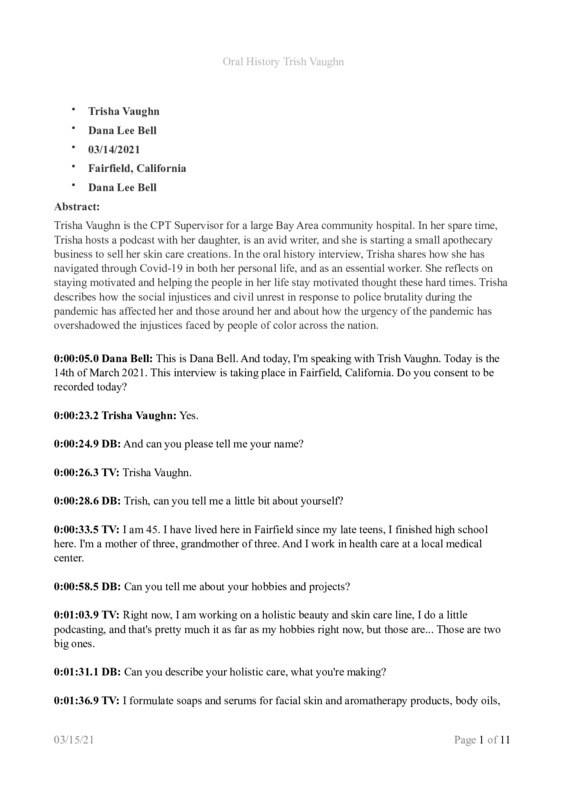 03/14/2021
03/14/2021Trisha Vaughn Oral History, 2021/03/18
Trisha Vaughn is the CPT Supervisor for a large Bay Area community hospital. In her spare time, Trisha hosts a podcast with her daughter, is an avid writer, and she is starting a small apothecary business to sell her skin care creations. In the oral history interview, Trisha shares how she has navigated through Covid-19 in both her personal life, and as an essential worker. She reflects on staying motivated and helping the people in her life stay motivated thought these hard times. Trisha describes how the social injustices and civil unrest in response to police brutality during the pandemic has affected her and those around her and about how the urgency of the pandemic has overshadowed the injustices faced by people of color across the nation. -
2021-02-23
How Covid-19 effected me
Around March 2019 I was a freshman in college. At this time I was attending an HBCU in North Carolina 10 hours from where I live. Around this time Covid was relatively new and we didn't know much about it. About mid March the whole school received an email that we all had to pack up and leave campus by the following week and for some people that was easy because they lived either in North Carolina or in a close distance. After finding put this information I had to contact my parents and let them know of the situation. My family isn’t poor but we are not rich either so the finical stress that was put on them to call off of work and try and get some type of rental car big enough for all of my things without paying a bunch of money because we didn't have that to spend and rental companies already knew that this time was coming so of course they used it as a way to get more money my raising all the rental prices. So fast forward I come home and now were doing virtual school which was okay I really missed campus and my friends and class was so much more boring staring at a computer screen all day all the stores were closed it honestly felt like the world around me just completely stopped grocery stores closed no tissue or paper towels it was just everything happened so fast but I’m so grateful for my parents for coming to get me because they could of easily made me stay with a relative but they sacrificed a lot to get me home and I really appreciate it so much
